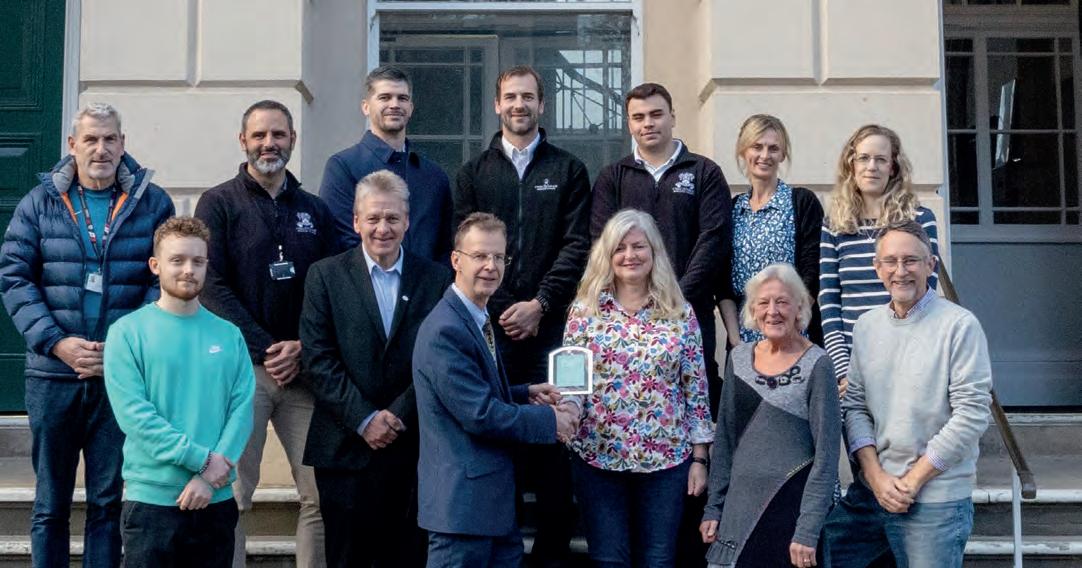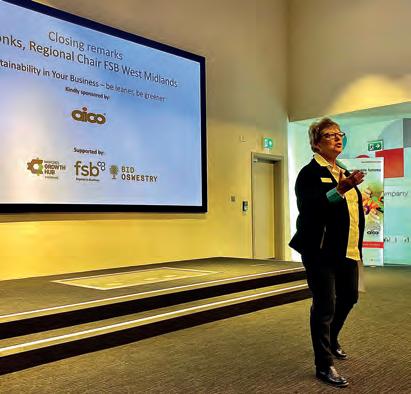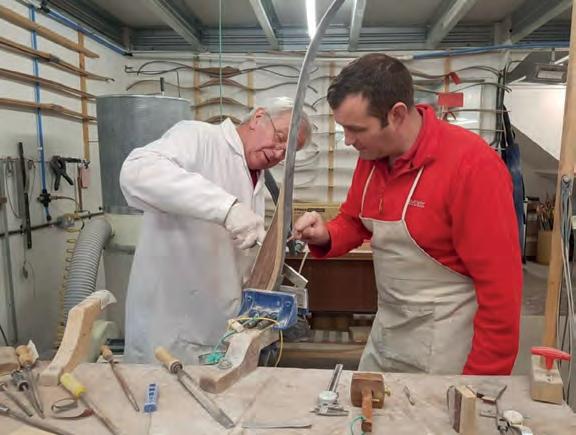PRODUCTIVITY BOOST
How to lift your firm without the need for expensive investments
FINANCIAL MANAGEMENT Coping with the current economic challenges
LANDLINE SWITCH-OFF Are you ready for this infrastructure shake-up?
SUSTAINABILITY IN ACTION The small businesses taking giant leaps




PRODUCTIVITY FINANCIAL MANAGEMENT LANDLINE SWITCH-OFF FEBRUARY-MAY 2023 DRIVING BUSINESS AMBITION FIRSTVOICE.FSB.ORG.UK | FEBRUARY-MAY 2023






Call 020 3962 8009 any weekday 9am - 5.30pm www.fsb-insurance-service.com Everyone could do with a helping hand on their business journey. Scan me to book a call back Insurance broking created by FSB. For FSB members. FSB Insurance Service Limited is authorised and regulated by the Financial Conduct Authority (FCA Registration No: 788654) Registered Office: 20 Fenchurch Street, London, United Kingdom, EC3M 3AZ. Company Number: 10831430
heads up
first steps
44 Making tax digital Preparing for the transition
48 My journey
Clive Loseby on making the internet more accessible
50 Ask the experts
Limited company liability and the rules on direct marketing

member spotlight
51 Member news
Free-from brand’s sweet deal, bow-maker hits 60 years in business, and MBE awarded to allergy campaigner
54 My business
Kristian Cuffin on growing Cuffed-in Coffee from a mobile horse trailer to two bricks-andmortar coffee shops
55 Member benefits
Answering your pressing insurance queries – and how FSB membership has helped one business in the Scottish Highlands
16 Turbo charge your firm
Peter Crush reports on the productivity crisis facing British businesses, and ways of boosting your own firm’s output
20 Stay in control
As costs rise and recession looms, Penelope Rance considers how businesses can help mitigate the economic pressures they face
26 Brave new world

Many small businesses are unprepared for the PSTN switch-off in 2025, says David Adams

30 Deep dive
SMEs are finding access to finance both difficult and out of date
32 Making a difference
Alex Wright on how firms are doing their bit for the environment, from going electric to plastic alternatives
36 Decisive action
Penelope Rance outlines steps that businesses can take to help ride out the next few months
february-may 2023 | firstvoice | 3
6 Need to know Upcoming tax changes to watch out for, more small businesses switch to challenger banks, and the widespread problem of under-insurance 9 Data centre Small business confidence falls to a record low amid ongoing economic challenges 10 Regional voice Round-up of regional news 13 Opinionated Tina McKenzie on US exports, Liz Barclay on tackling late payment culture, and Bernard Marr on upcoming tech trends advice 40 How to ...Secure the best talent for your firm; use marketing automation to drive sales 43 Legal Reducing employee costs without having to resort to redundancies inside firstvoice.fsb.org.uk
features
FEBRUARY-MAY 2023
26
6
40
MARTIN McTAGUE, NATIONAL CHAIR
tech bits
Publisher: Aaron Nicholls
Editor: Nick Martindale
Email: firstvoice@redactive.co.uk
Lead designer: David Twardawa

Picture researcher: Claire Echavarry
Sub-editor: Kate Bennett
Production: Aysha Miah-Edwards
Email: aysha.miah@redactive.co.uk
Advertising Email: fsb@redactive.co.uk


Tel: 020 7324 2726

SMALL BUSINESS OWNERS ARE generally an optimistic and adaptable bunch, pivoting and innovating to respond to challenges and opportunities that come our way. It doesn’t take me to tell you that the last three years, through pandemic, political upheaval and a cost-of-doingbusiness crisis, have tested that resilience.
While many headwinds are blowing strongly, and there is hardship out there, I feel it’s good for us to look at reasons for a hint of cautious optimism. Tough times force us to question how we do what we do, thinking of new ideas or ways of working.
In this edition of First Voice, we look at assessing productivity, and also at different ways of approaching our finances. FSB’s Policy Chair Tina McKenzie gives her thoughts on how more small firms could potentially benefit from new international trade deals, in particular with the US.
One feature looks at efforts to be more sustainable in our businesses longer-term, doing our bit for the planet while also bringing down energy bills. However, for many, investment in greener energy is unaffordable, which is why I would like to see the government introduce ‘help-to-green’ vouchers to support small firms with the cost of the changes.
As we head towards the Spring Budget, the UK Government should be focused on pro-growth, pro-enterprise measures that support economic recovery and improve our optimism. Bringing down the tax burden, better support through the energy crisis, new ways of financially incentivising innovation, and real action to tackle late payments would be a good start.
With the right policies to support entrepreneurship, there would be light at the end of the tunnel.

Follow Martin on Twitter @MMcTagueFSB



First Voice is available on subscription at £42 per annum. For details, contact publications@fsb.org.uk

First Voice has an audited net average circulation of 112,657 (July 2021 to June 2022).
AccessAbility help. If you require this document in an alternative format, please ring 01253 336036 or email: AccessAbility@fsb.org.uk

First Voice is published on behalf of the Federation of Small Businesses (FSB) by Redactive Publishing Ltd (Tel: 020 7880 6200) firstvoice.co.uk | redactive.co.uk 4 | firstvoice | february-may 2023 firstvoice.fsb.org.uk
58 New kit and apps The best new gadgets and apps for small businesses 60 Digital voice Member December winners out of office 62 Try something new Giving back by sponsoring a local sports team 64 Out and about Take advantage of the UK’s breathtaking scenery last word 66 Guy Browning The connections that can alter the course of your business
62 This edition of First Voice went to press on 31 January. All information is correct as of that point. inside february-may 2023 first word
hope you enjoy reading this edition of First Voice which you receive as part of your membership with FSB. We'd like to ask you to please consider the environment when you've finished reading it and pass it on to colleagues, friends, family or your business associates to have a read too before recycling it. FSB takes the privacy and protection of your data very seriously, and if you would like to find out more about this, please visit www.fsb.org.uk/privacy. If you would prefer not to receive the magazine at any time, please contact Customer Services on 0808 20 20 888 or by email to customerservices@fsb.org.uk Federation of Small Businesses Registered Office: Sir Frank Whittle Way, Blackpool, Lancashire, FY4 2FE. VAT No. 997 3427 63. The National Federation of Self-Employed and Small Businesses Ltd (FSB) is registered in England, number 1263 540. While every care has been taken in the compilation of this magazine, errors or omissions are not the responsibility of the publishers or of the editorial staff. Opinions expressed are not necessarily those of the publishers or editorial staff All rights reserved. Unless specifically stated, goods or services mentioned are not formally endorsed by FSB, which does not guarantee or endorse or accept any liability for any goods and/or services featured in this publication. ISSN 2399-5467 Copyright: FSB Publications Ltd This copy of First Voice magazine, and the paper envelope it was delivered in, are 100% recyclable FSB Publications: Email: publications@fsb.org.uk Tel: 0808 20 20 888 fsb.org.uk FSB Editorial Director: Alan Soady able o hat u c, feelit’sgoodforustolookat R Printed by Warners
We





















ORG ID REGISTERED ORGANISATION
heads up
Recognition for FSB stalwart
Natalie Gasson-McKinley, FSB Development Manager for Derbyshire and Nottinghamshire, has been awarded an MBE for services to business in the East Midlands.

Tax changes coming into force in April
ARANGE OF TAX CHANGES WILL come into effect from April:
Corporation tax: Rises to 25 per cent for companies with annual profits of over £250,000. Those with profits of £50,000 or less will remain at 19 per cent, with a marginal relief system in between.
Business rates: Rateable values will reflect the property market as of 1 April 2021. In England, a support package will help firms whose bill is increasing and that stand to lose small business or rural rate relief. The Government, in this case, has pledged bills will go up by no more than £600 for the 2023-24 tax year.
In Wales, the non-domestic rates multiplier is frozen for 2023-24, and a transitional relief applies to all ratepayers whose bills increase by over £300. Those in retail, leisure and hospitality will get 75 per cent non-domestic rates relief.

The Scottish Government intends to freeze the business rates poundage and “reform and extend eligibility for the Small Business Bonus Scheme (SBBS)”. The threshold for 100 per cent relief will fall to £12,000, and the upper rateable value for individual properties to qualify for SBBS relief will rise to £20,000.
The Scottish Government will also offer Small Business Transitional Relief for properties that lose SBBS or rural rates relief. The increase in the rates liability will be capped at £600 in 2023-24.
IR35: Rules remain in place, and HMRC is expected to ramp up compliance.

Income tax: The personal allowance remains £12,570, with 20 per cent payable on earnings of £12,571-£50,270, 40 per cent on £50,271–£150,000, and 45 per cent on £150,000+. In Scotland, a 42 per cent rate will come in on £43,663£125,140 and 47 per cent on £125,140+.
Dividend tax rates: The same as 2022-23, but the annual dividend allowance will fall to £1,000 in April 2023, and to £500 from April 2024.
Annual Investment Allowance: This will remain at £1 million.









Making Tax Digital’s extension to Income Tax and Self Assessment has been pushed back. It will now apply to those earning £50,000+ from April 2026, and £30,000–£50,000 from April 2027.
See our feature on how to prepare for Making Tax Digital on page 44
The honour was awarded for her work championing small businesses to councils, education providers and other stakeholders. “Very often large businesses can dominate a conversation, so my role is to ensure the views of small businesses are heard,” she says.

It was also recognition for her activities outside of the day job.
“There was an element of the award that was for me using my voice to diversify boardrooms and decision-making spaces,” she says.


“That was for the work that I do with Nottingham Playhouse, and because I was one of 30 people selected from over 1,000 to take part in Lord Woolley’s Operation Black Vote leadership programme to nurture Britain’s future black, Asian and minority ethnic leaders.”
Ms Gasson-McKinley says she’d no idea she had been nominated when she received an email from the Cabinet Office.
“I spent a good while not being able to process the magnitude of it all,” she says. “Then, as the letter was sent in the strictest dence, a whole month of not being able to share my news followed and that was a real challenge.” Congratulations from all at FSB.
1 2 firstvoice.fsb.org.uk 6 | firstvoice | february-may 2023 8 THINGS YOU NEED TO KNOW
AWARDS
TAX
Cabi “I spent
go
t says.
in confidence month able new an re C f e
end n 2024. nce: on to nt m
be receiv
a
able
“Then was sent
as
Bank move on the agenda for SMEs
3 heads up need to know
Flexibility is the order of the day
quarter of small businesses are considering switching to a challenger bank in 2023, research by financial services review site Smart Money People finds.
A
Medium-sized businesses with 50-250 staff members are most likely to switch to a challenger bank or fintech.
The main reasons given for considering challenger banks were lower fees (45 per cent), higher interest rates (33 per cent), better online services (33 per cent), incentives such as cashback or free banking for a period of time (31 per cent) and better customer service (29 per cent).
The study suggests 51 per cent of small firms are thinking of reviewing their bank this year, with over half of these (54 per cent) considering a switch to a challenger bank or fintech firm, and 46 per cent looking at a high street bank.Jacqueline Dewey, CEO of Smart Money People, said: “Many so-called challenger banks are now household names as their user experience and agile approach has proven attractive and lured people away from the traditional high street providers. Our research shows that 2023 may be the year when small businesses follow this trend.”

Energy support significantly scaled back
The Government has announced that the energy support scheme to support businesses will be curtailed from April.
Under the new scheme, until March 2024, businesses with energy costs of over £107 per MWh for gas and £302 per MWh for electricity will receive a discount. Bills will be reduced by up to £6.97 per megawatt hour (MWh) for gas bills and up to £19.61 per MWh for electricity bills. Heavier users will get larger discounts.
Martin McTague, FSB National Chair, described the move as a “huge
firstvoice.fsb.org.uk
disappointment”. “For those struggling, the discount through the new scheme is not material,” he said. “Many small firms will not be able to survive on the pennies provided through the new version.”
Most small firms would now face a cliff-edge after March, he warned. “The fish and chip shop around the corner, your local pub, and the independent laundrette will see higher bills,” he added. “Gambling that wholesale energy prices will continue to fall is transferring the risk of further energy price shocks to small businesses.”
More employees would prefer to work flexibly than from home, according to a survey by HR and payroll firm MHR.
FINANCE HOME WORKING 5
It found 51 per cent would prefer to work from an office with flexible hours, while only 41 per cent chose working from home with structured hours.
The research suggests a lack of support and company puts many off home working. Two-fifths (41 per cent) noticed a fall in support from management and team members when home working, and 37 per cent said they felt lonely. A quarter (26 per cent) said a lack of social interaction contributed to burnout and 24 per cent said it made them less productive.
Anton Roe, CEO at MHR, said: “What is clear is the atmosphere and comradery present in the office simply cannot be replicated in a remote working environment.
“Flexible working puts employees in control of their hours and work environment, allowing them to tailor their ways of working to their own needs and resulting in increased engagement.”
41%
said their preference would be to work from an office with flexible hours chose working from home with structured hours
4 february-may 2023 | firstvoice | 7
UTILITIES
51%
Downing St do for Welsh food firm
AT THE END OF NOVEMBER
FSB member SamosaCo, based in Rhondda Cynon Taf, South Wales, was invited to feature as part of the Downing Street Festive Showcase 2022. The event saw Downing Street transformed into a bustling street market with 12 small businesses from across different sectors and regions of the UK.

Approximately 100 guests were invited to attend, including ministers, MPs, national and international journalists and photographers, along with a selection of entrepreneurs and business leaders.
At the event, SamosaCo representatives Tee Sandhu, Goldie Sandhu and Karen McCarthy presented Prime Minister Rishi Sunak and his wife Akshata Murty with their range of tasty food. They
INSURANCE
also discussed the background and ethos of the family business and the role the company plays as Export Champions of Wales for the Department of International Trade.
Goldie, Tee and Karen also met other members of the UK Government at the event, including Chancellor Jeremy Hunt and Minister for Small Business Kevin Hollinrake.
SamosaCo has gone from making fresh samosas for friends, family and customers in its Cardiff store to having a purpose-built factory making a wide range of authentic products, including its famous onion bhaji scotch egg.
Recession to spark new generation of businesses
One in three Brits plans to start a business in 2023 – up from just one in 10 people in 2022 – according to research by Quickbooks.
The study found that 34 per cent – or 17.9 million people – want to start their own firm, with 84 per cent planning to do so as a side hustle. Some 16 per cent intend to devote all their attention to their new venture.
The economic outlook is a factor, with 56 per cent saying inflation means they need to additional income and 42 per cent saying they are looking to protect their income.
Most (70 per cent) plan to finance the business with their own resources, 24 per cent aim to borrow from family or friends and 15 per cent plan to use government funding.
Many entrepreneurs are looking to the internet to build their business, with 43 per cent planning to launch a website and sell online, and 27 per cent expecting most income to come from social media as a creator or influencer business.
Small firms warned about under-insurance
Small businesses are risking catastrophe by failing to ensure their buildings are adequately insured, FSB Insurance Service has warned.
Research by RebuildCost ASSESSMENT.com suggests a staggering 79 per cent of properties are under-insured,
by an average of 31 per cent.
Even contracts that were originally based on accurate valuations may now be undervalued, says David Perry, Managing Director of FSB Insurance Service.
“Under-insurance is becoming a major concern in the

insurance industry,” he says. “It was initially fed by supply chain and labour issues and has been made significantly worse as we see inflation soar.
“The impact can be devastating to SMEs as any claim payment is reduced in proportion to
the percentage of underinsurance. We’re urging all members not just to check their rebuild and contents replacement valuations but also to make sure their business interruption and liability coverage meet requirements too.”
7 heads
up need to know
firstvoice.fsb.org.uk 8 | firstvoice | february-may 2023
FOOD AND DRINK
6 K
ENTREPRENEURS
SamosaCo founders Tee and Goldie Sandhu
8
data centre
CONFIDENCE
Confidence hits record low as economic concerns rise
Small business confidence fell to a record low outside of lockdowns in Q3 2022, as concerns over a looming recession grew.
FSB’s Small Business Index fell to -35.9, with those in Scotland and Cornwall the most downbeat. Confidence fell across every sector apart from IT and communication.
Small businesses across all sectors are being hit by rising costs, with a net balance of 85.4 per cent reporting increased operating costs. This was down on the previous quarter’s figure of 85.9 per cent – the first fall since Q1 2021.
This is also hitting revenue, with a net balance of -11.8 per cent reporting revenue growth during the quarter, and just 47 per cent having growth aspirations in 2023. More than one in 10 (14.1 per cent) expect to downsize or close in the next year. The domestic economy is seen as the biggest barrier to growth, cited by 60.6 per cent, but there was also a rise in those pointing to falling consumer demand, at 32.9 per cent.
The proportion of small firms applying for credit was 12.6 per cent, from 11.5 per cent in Q2.
BUSINESS CONFIDENCE BY SECTOR
27%
The proportion of SMEs planning to make cost savings through their workforce this year. Of these, some 44 per cent are looking at restructuring or redundancies, research from WorkNest claims
67%
The amount of small business owners who say they are happy with the state of their business despite the economic outlook, according to a survey by Vista
The amount of planned small business investment which didn’t go ahead in 2022, research from Together finds. SMEs invested £565,000 out of a planned £710,000
heads up in-depth
february-may 2023 | firstvoice | 9 firstvoice.fsb.org.uk
£145,000
SMALL
Most confident Least confident SMALL BUSINESS CONFIDENCE BY REGION -70 -60 -50 -40 -30 -20 -10 0 10 20 QUICK FIRE STATS Q4 2021Q1 2022Q2 2022Q3 2022 +15.3 -24.7 -35.9 20 15 10 5 0 -5 -10 -15 -20 -25 -30 -35 -40 -8.5 Information and communication Construction Wholesale and retail Manufacturing Accommodation and food service activities Professional, scientific and technical -46 -47 -28 -38 -37 -33 -28 -33 -29 -33
SMALL
BUSINESS INDEX SNAPSHOT
-67 -63 -57 -22 -16 +12
regional voice
Welsh Government heeds FSB call on business rates
The Welsh Government has responded to FSB’s calls and announced a package of support to ease business rates over the next two years.
NORTH OF ENGLAND Report assesses entrepreneurial potential amid lofty aspirations
FSB’s north of England team is undertaking research to feed into an upcoming report on what is needed to make the region the best place in the UK and beyond to start and grow a business.
The Entrepreneurial North research will look into the barriers to success impacting the small business community, giving small business owners the chance to feed in their views on what they need to thrive.
FSB’s recent Small Business Index found business owners across the north of England are among the least confident in the UK when it comes to their business outlook for the coming months.
Both FSB members and non-members have been invited to input their views, to ensure the experiences of grassroots business owners inform and direct the outputs of the report.
FSB’s Policy Representative for Yorkshire, The Humber and the North East, Mohammed Hussain,
said: “Across the north-west, north-east, Yorkshire & The Humber, 99 per cent of the 1.05 million businesses are SMEs and sole traders. Small business confidence and sentiment is at an all-time low, with businesses across the north faring below the national average.
“By their nature, small business owners and entrepreneurs are dynamic and innovative – resilience and optimism are core attributes of those who choose to take the self-employment leap. Their confidence and optimism taking such a huge plunge is indicative of the significance of the challenges they face.
“Now more than ever it’s crucial to ensure policy and decisionmakers understand the challenges for businesses in the north and act to address them.”
If you’d like to share your experiences and views as part of the research, please email Reshma.Begum@fsb.org.uk
The upcoming draft Welsh Government Budget will see the non-domestic rates multiplier frozen for 2023–24 to combat inflationary pressures, and a transitional relief for ratepayers whose bills increase by more than £300 following the UK-wide rates revaluation in April.
The Welsh Government also announced that those within the retail, leisure and hospitality sectors will receive 75 per cent non-domestic rates relief for 2023-24, up from the 50 per cent provided in 2022-23. The support package is expected to be worth more than £460 million over the next two years.

Ben Cottam, Head of Wales at FSB, said: “This announcement provides some much-needed certainty for small businesses.
“FSB Wales has long called for the Welsh Government to use its business rates levers to support small businesses, and are pleased to see Welsh Government respond with a package that provides breathing space and support to the firms that hold the key to reviving our economy.”
10 firstvoice.fsb.org.uk 10 | firstvoice | february-may 2023 heads up area update
WALES
ROUND-UP
OF REGIONAL NEWS
Knaresborough, North Yorkshire
South-west councils rewarded for SME support
Four south-west councils have been awarded prestigious FSB ‘best in the region’ awards for their support for the local small business community.
The four – Cheltenham, Cornwall, East Devon and Bristol – were among 250 councils in England that entered the inaugural FSB Local Government Awards, to recognise the councils that go the extra mile to try to support and encourage their local SMEs and self-employed business owners.
Cheltenham Borough Council was named as the south-west regional winners in the Covid-19 support category, East Devon District Council scooped the future-ready prize, Cornwall CIOS was honoured for its programme of business support while Bristol was named as the south-west champion in the ‘all round business friendly’ category.
Gloucester City Council, South Gloucestershire Council, Cotswold District Council, Swindon Borough Council, Somerset County Council, Stroud District
SCOTLAND
First Minister recognises Scottish entrepreneurism

FSB was pleased to accept an invitation from Scotland’s First Minister Nicola Sturgeon to her official residence to celebrate winners of its Celebrating Small Business Awards. Winners from 2020 and 2022, including representatives of both years’ overall Small Business of the Year Award winners, came together to talk about their achievements with the First Minister.
Speaking after the event, FSB’s National Chair Martin McTague (pictured with Nicola Sturgeon) said: “It was a great honour to receive such a warm welcome from the First Minister. Our Celebrating Small Business Awards showcase the best of the small business community across the country and, in these difficult times, it’s
more important than ever that they know we’ve got their back.
“We welcomed businesses from every part of Scotland – from the urban bustle of the cities, to the rural splendour of the Highlands – and in every sector from manufacturing, ecommerce, education, tourism, retail and more. They are hugely diverse, but have one thing in common – they’ve come through several exceptionally difficult years and are still delivering for their customers.
“If this is what they can do in the teeth of a pandemic and cost-of-doing-business crisis, just imagine what they’ll be doing when more favourable trading conditions return. The sky will be the limit.”
Council and Somerset West and Taunton Council were all featured in the regional shortlists, with judges admitting to being very impressed with the quality of entries from all across the region.
All the winners were announced at an online FSB awards final – which recognised SMEs throughout the whole of the UK – and, following the presentations, FSB volunteers and staff visited the local councils that had won prizes to present them with trophies.

heads up area update
SOUTH-WEST
february-may 2023 | firstvoice | 11 firstvoice.fsb.org.uk
FSB Gloucestershire’s Russell Warner presents Cheltenham Borough Council representatives with their FSB award for support during Covid
heads up area update
LONDON
Council awarded for promoting pop-ups
Representatives from Westminster City Council called into FSB’s new Westminster offices to pick up its Local Government award for its work in promoting pop-up businesses.

The award recognised Westminster’s Meanwhile Activations Programme, which aimed to enliven vacant premises and provide a unique opportunity for small businesses and artists to occupy rent and rate-free space in the West End. This included applying National Non-Domestic Rates Localism Relief to remove rates liability.
The first phase of the scheme focused on emerging local and UK artists and cultural organisations, and the second on attracting up-and-coming local and UK-based entrepreneurs to deliver experiential retail, transforming larger vacant stores on Oxford and Regent Street into mini-department stores.
At the time of writing, the programme has activated 12 void units and supported over 43 brands, emerging artists, social enterprises and start-ups.
WEST MIDLANDS
Event highlights eco benefits for businesses
FSB took part in a sustainability event run in conjunction with other organisations, with the aim of highlighting how environmentally sound policies can also be good for business.
Michael Goodall, Development Manager, Shropshire, Herefordshire and Worcestershire, was involved on the steering group, and helped to shape content for the event. “My main aim was to imbue a strong small business focus, highlighting the commercial benefits of being more sustainable as well as the ecoarguments,” he said. “This included coming up with the ‘Be Leaner, Be Greener’ tagline, which was adopted in pre, during and post-event publicity.”
Sue Tonks, FSB Regional Chair West Midlands, gave a closing statement to the audience of local businesses and stakeholders, which highlighted FSB’s sustainability hub and work on Clean Air Zones.

Other bodies taking part in the event included The Business Environment Network, Shropshire Growth Hub, Oswestry BID and the Wildlife Trust.
The event was hosted by Oswestry-based business Aico, which manufacturers smoke and CO detectors.
SOUTH-WEST
FSB part of ambitious new south-west ‘powerhouse’ vision
FSB is supporting plans to establish a new economic ‘powerhouse’ in the south-west that could bring jobs and support for small businesses across a wide area of the region.
The Great South West powerhouse had its official Parliamentary reception in the middle of January to launch its ambitious prospectus. FSB representatives from both Devon and Cornwall joined forces with MPs, local authorities and Local Enterprise Partnerships at the event to stress the collective desire to make this a success for the region.
The new Great South West powerhouse will cover Cornwall, Isles of Scilly, Devon, Somerset and Dorset. It aims to secure the sort of financial and economic support already enjoyed by established powerhouses elsewhere including Greater Manchester, the West Midlands and the recently formed Western Gateway, which covers the northern part of the south-west including Gloucestershire, Bristol, Bath, Wiltshire and North Somerset.
Karl Tucker, Interim Chair of the Great South West Partnership, said: “Together, we have the potential to become a world leader in the blue and green aspects of our economy, strengthening our region’s clean growth and contributing to the country’s journey to net zero.
“This is a key moment in the journey of the south-west, which is why we are delighted to set out the breadth and scale of our region’s blue and green opportunity in Parliament, as part of our work to gain further Government support.”
Pictured from left to right are Renata Guerra, West End Activation and Pop-up Project Manager; Councillor Geoff Barraclough, Cabinet Member for Business; Councillor Adam Hug, the new Leader of the Council; and FSB National Chair Martin McTague.
firstvoice.fsb.org.uk 12 | firstvoice | february-may 2023
Have your say
costs and complexities for small rms expanding into new markets.
We also touched on specific challenges faced by women-owned SMEs.
overshadowed by the ‘good vs. bad’ nature of the commentary around the dispute.




businesses to trade with.

THE US TOPS THE LIST FOR UK small
Nearly half (46 per cent) of FSB members who trade internationally pick the US as the most important individual country market to export to, and in a span of four quarters to the end of June last year, more than 20 per cent of the UK’s total export went to the US –totalling £142 billion, according to the most recent Government figures.
However, trading with the US is not without challenges. The complexity of federal and state rules and the lack of market knowledge are of particular concern for UK small firms.
Free trade agreements (FTAs) are essential to support small exporters in this space. More than a third of small business exporters think FTAs are the most useful intervention to help them increase the value of exporting activity. With the Government’s freedom to strike new trade deals, we’re campaigning to prioritise markets that our members flag as key, and the US is one of them.
At the UK-US SME Dialogue in Edinburgh last November, we made clear the importance of the US market to small businesses here and discussed the need to use digital tools to reduce paperwork, streamline trading practices and reduce
When it comes to UK-US trade negotiations, it’s inevitable that the Northern Ireland Protocol is looked at – Washington has been actively engaged in this discussion. As things stand, our members sit within a number of categories: those for whom the Protocol is working well; some that are protected from its worst impacts because of the grace periods; and others in service businesses where it has no real relevance.
One of the main tenets of the Belfast/ Good Friday Agreement was the need to support minorities, so it should be of great concern that the operation of the Protocol is seeing a significant minority of businesses badly impacted. Supporting this group, which is suffering as a result of the arrangement’s deficiencies, should be at the forefront of everyone’s minds.
In the runup to the 25th anniversary of the Belfast/Good Friday Agreement, I’ll be leading an FSB visit to Washington in March, picking up where we left off in November. It’ll be an occasion to meet and make friends and allies in different parts of the US polity and, most importantly, fly the flag for further co-operation to bring down trade barriers facing SMEs.
What enables FSB to engage in these dialogues and influence policy is evidence from our members. FSB’s Big Voice online research programme is a backbone of our policy and advocacy work. All members are encouraged to be part of the Big Voice community so that we get evidence from members across all sectors, from all regions and backgrounds, and of all sizes and stages in their business journeys.
However, a significant minority are really struggling to navigate the scale of customs declarations, compliance checks and increased staff and transport costs as a result of the new trading regime between Great Britain and Northern Ireland. The disproportionate impact of the Protocol on these businesses, mainly micro and small firms, has been



I encourage members who have not already done so to sign up to Big Voice at fsbbigvoice.co.uk. The surveys are designed with busy small business owners in mind and so take very little time, but the outcome is far-reaching.

february-may 2023 | firstvoice | 13 firstvoice.fsb.org.uk heads up UK/US trade relations
The US remains our most important country from an export perspective, but the Northern Ireland Protocol is causing headaches for many small firms. It’s time to ensure your voice is heard
A significant minority are struggling with customs declarations, compliance checks and increased staff and transport costs
an P fi cost c firm fi We al faced f fa a ac c ce When Wh negotiati negoti N Noorrtth
TINA MCKENZIE is UK Policy and Advocacy Chair, FSB
Illustrations: Sam Kerr
TINA MCKENZIE
heads up late payments







































LATE LAST YEAR, I WAS TALKING to business owners in York. We talked about the state of small business and the situation in the city, where optimism is holding up as tourists make a beeline for it.
The issue of payments arose, but it isn’t the top concern. Skills shortages dominate, with the cost of doing business being the second-biggest concern. How do you protect margins and keep prices affordable when your materials costs are rising by 30 or 40 per cent?
Payments underly all this. Cashflow is king. If you have cashflow gaps, it’s increasingly difficult to bridge them. Banks suggest simply extending overdrafts – cheaper, many tell me, than invoice financing. Cards (personal and business) are maxed and friends and family are supportive but have their own cost-of-living increases to manage.
People working in accounts payable departments usually haven’t run their own small business – while small business owners, used to doing all their own marketing, invoicing, accounts and so on, don’t realise that their invoice is one of thousands caught up in complicated approvals and payment systems.
We hear from big businesses that aspire to pay 95 per cent of invoices to small businesses within 30 days. Many are spending millions on updating their processes – but not all firms will get board approval for the necessary spend while there are competing demands for R&D, equipment, training and so on.
understand how to make invoices payable, put payment performance on governance audit and environmental, social and governance agendas, and communicate.
Small firms need to be paid quicker. Worrying about your limited cash resources while waiting to be paid causes sleepless nights and mental health issues.

During the pandemic, many big fi realised it was in their own interest to pay small suppliers quicker than competitors, and average days-to-pay dropped slightly. However, research from EY and Xero shows that figure increasing again, to around 36 days. Some firms are offering extended payments terms; I heard a case where suppliers were told that terms were increasing immediately from 30 to 60 days, with no opportunity for negotiation.
Small firms can offer their own payment terms, negotiate better terms or walk away –which takes a brave person. Where will the next job come from? Will terms be any better? If you negotiate, will the customer find a new supplier? Does pushing back damage the relationship?
, than and nd ir own e ker. causes h issues. g firms st to pay petitors, EY and g again, re ms; I re told , with wn er terms rave b come

















The Small Business Commissioner (OSBC) team resolves disputes involving amounts ranging from a few pounds to hundreds of thousands. Big firms often don’t realise that owing £300 to a small business for a few days can be existential.

We need to understand each other better, build closer relationships, apply the principles of partnership working and stewardship, onboard suppliers so they
better build closer the principles of partnership working and the pr steewwar
does the cl 30/60/90 d invoice? O month-en

What are your standards terms? When does the clock start ticking on ‘within 30/60/90 days’? On date of receipt of invoice? On approval? On 30 days month-end, as one woman in York gets paid? Small firms need certainty about when the cash will hit their account. Clear, consistent, comprehensible communications between small suppliers and bigger customers will help. Calls for legislation to mandate payment to small rms within 30 days may be heeded, but we must be clear what ‘30 days’ means and have resources for enforcement. is will take time. In the meantime, do the right thing. Paying quickly and fairly is reputationally positive, benefits everyone, and investors love it. Small rms need certainty. #PayDontDelay
LIZ BARCLAY is the Small Business Commissioner. Views expressed are those of the author and not necessarily those of FSB

Paying the price
firstvoice.fsb.org.uk 14 | firstvoice | february-may 2023
Closer relationships and better communication between small and larger businesses are needed if we are to break the devastating cycle of late payment
Big firms often don’t realise that owing £300 to a small business for a few days can be existential
r? If nd
when the Clear, c communi bigge legislation
wit we must and have This w the is reput everyo firms
Sma
firms
LIZ BARCLAY
ITH AN ECONOMIC DOWNTURN


Wlooming, small businesses are feeling uncertain. Running a small business has always been an evolving process that involves a lot of challenges, and never more so than now.

As a futurist, it’s my job to predict the critical future trends that businesses must be ready for. No matter what industry you’re in, technology will impact your business, and getting ready for change will be important to maintain your edge.
What’s the best way to prepare for 2023, specifically around technology? How can you make the right decisions for your company? These are the key business and technology trends you must be ready for.
Artificial intelligence



Artificial intelligence (AI) has become ubiquitous, and more small businesses are finding ways to optimise their processes and provide new products and services with AI tools. In 2023, ‘as-a-service’ and no-code AI platforms will make AI more accessible to small businesses that want to improve and manage products, automate services and leverage customer data.




Small business owners can also augment their workforce with AI. Some jobs will disappear, but new ones will emerge to replace them. The skills that machines can’t replace, such as critical
heads up future trends

In with the new
thinking, problem-solving and emotional intelligence, will be highly valued, and small businesses should have a training plan to upskill and reskill their workers.
Immersive customer experiences
One of 2022’s biggest trends was better customer experiences. Customers are demanding a high-quality experience as part of their buying journey, and this is one way to differentiate yourself.
Many consumers now make buying decisions based on ethics
Small companies can use technology to streamline the purchasing process. This can include customer service portals and recommendation engines, but could also expand into providing immersive experiences, both in-person and online.
The metaverse – a catch-all term to describe the next iteration of the internet, where we will interact with brands and peers through immersive technology such as virtual reality and augmented reality – will be one of the hottest trends in 2023.
Prepare by thinking about how you can use the metaverse to deliver more immersive, rewarding experiences. Also think about how you can use metaverse platforms to work collaboratively,
onboard and train employees, and make processes more efficient.
The talent challenge
Since the beginning of the pandemic, workers have been reassessing what they want from their careers. This has put pressure on employers to provide enticing work environments. Small businesses are competing for workers with the biggest companies. Rise to the challenge by providing:
The flexibility of remote or hybrid work
A diverse, values-oriented culture Opportunities to grow and learn Fulfilling, engaging work at all levels.
Conscious consumerism
Many consumers now make buying decisions based on ethics, with two-thirds saying they are “belief-driven” and want to buy environmentally-friendly products from businesses with environmental, social and governance principles.
Small businesses should reduce packaging waste, decrease energy and water consumption, and be fully transparent about manufacturing and supply chain practices.
Whether you’re new or established, change is afoot; keep your eye on these key trends to stay competitive.
BERNARD MARR is a futurist, strategic advisor and author of Future Skills: The 20 Skills and Competencies Everyone Needs to Succeed in a Digital World (Wiley). Views expressed are those of the author and not necessarily those of FSB



The start of a new year is a good time to engage in a bit of trend-spotting, helping you identify the big technological changes that will shape the world of work over the next 12 months
BERNARD
in th t think thhiin em va ha re Imm One o e custo t to o BER february-may 2023 | firstvoice | 15 firstvoice.fsb.org.uk
MARR
12% The productivity boost derived from having happy staff, according to the University of Warwick








1.8bn


The number of hours office workers lose as a result of dated technology, according to Insight

feature productivity 16 | firstvoice | february-may 2023
TURBO CHARGE YOUR FIRM






The one crumb of solace for small businesses upended by Covid-19 was that the two things it accelerated – digitisation and greater flexible working – were both supposed to have improved the UK’s much opined ‘productivity problem’. FSB data shows just that just 40 per cent of SMEs had or used cloud services in 2018 – a figure that will be much higher today.
But despite the greater uptake of technology, UK productivity is still in a parlous place. The UK’s productivity growth was already the second slowest of the G7 between 2009-19, and in Q3 of 2022 output per worker fell for the second consecutive quarter.
The timing for all this couldn’t be worse. With the country heading towards a recession, inflation hitting a record high, and consumers cutting back,




small firms are finding it extremely challenging to grow and invest further. But when productivity is an issue that’s confounded economists for so long, is there anything SMEs can do that would really make a difference?



Cold realities
A simple approach – suggest experts –is for SMEs to try and put their finger on exactly where their productivity problems lie. But, given this is no easy task, there is a risk they follow their own ideological view about how gains are driven, rather than confronting the actual reality in front of them. “Productivity tends to be talked about around three areas – staff skills; investment in technology/machinery; and cultural considerations,” suggests Chris Russell, Senior Policy Manager at FSB.

“Our own Scaling Up report talks about the link between skills and



















february-may 2023 | firstvoice | 17 firstvoice.fsb.org.uk
feature productivity
Photography: iStock
At a time when the economic outlook is worsening, small firms need to do all they can to ensure they – and their staff – are operating as productively possible. Peter Crush outlines how to give your firm a boost without the need for expensive investments
productivity, as does our Innovation, but I suspect the real issue is trying to find out which will produce the most quick wins. Upskilling takes longer to show a return, but when firms are literally struggling for survival, are they really going to be implementing artificial intelligence or ecommerce or customer relationship management systems – even if they promise to yield efficiencies?”
Those who believe in investment suggest making iterative improvements, but only doing so if it’s aligned to an actual productivity-gain outcome. “Key is seeing where processes are disconnected, or which consume time, and then applying solutions, such as using invoice data automation that runs overnight,” says Stefano Maifreni, Founder of consultancy Eggcelerate, which aims to turbo-charge stagnating SMEs. “By focusing on the outcome – here tech can do the work of a fulltime employee for only 30 per cent of the cost – the decision to invest is clear. Just hiring someone to fix a problem doesn’t boost productivity, it worsens it.”
Rob Bright, CEO of training software provider Cloud Assess, agrees: “Training spend has to deliver new skills, otherwise what’s the point? Linked to this is understanding how employees best
learn new skills – whether it’s online or in-person. True skills development only happens when people make new connections in their brain and can practise and become exposed to a new skill time and again.”
Root causes


































Studies say that poor productivity has structural roots, such as having too many meetings – Otter.ai research finds 31 per cent are ‘unnecessary’ – or not having the right equipment (UK workers waste 1.8 billion hours a year because of dated technology, according to research by Insight).


“We haven’t thought carefully enough about how time is used,” suggests Sharath Jeevan OBE –author of Intrinsic: A manifesto to Reignite our Inner Drive. “I’m not talking about time management – that’s been done to death – but rather whether time is being put to the right place.



“Leaders aren’t aligning their time to a specific mission – such as boosting customer











Getting more out of staff
Judith O’Leary, founder of Edinburghbased PR and digital marketing agency Represent Comms, faced a difficult question. “We were anticipating small growth, but with looming uncertainty too, I was at something of a crossroads about whether to hire a new person,” she recalls. “Would doing this take time away from other staff, thus impacting their productivity? Or could we accommodate more work using our existing resources by working smarter?”
Intrigued by the challenge of the latter, she enrolled staff on a neuroscientifi app-based programme called Positive










Intelligence (PQ), developed by Shirzad Chamine, author of Positive Intelligence





It helps people identify traits that are their ‘saboteurs’ (including the ‘judge’, ‘controller’, ‘avoider’, ‘stickler’, ‘victim’ and ‘hyperachiever’), and the aim is for employees to do daily mindfulness exercises, or ‘PQ-reps’.
“The app teaches us how our saboteurs make us unproductive,” says Ms O’Leary. “If people are experiencing stressful moments, they take short time-outs or meditations that allow them to re-centre themselves, rather than trying to tough things through.”
As a timesheet-based business, Ms O’Leary says she clearly sees the productivity benefits (faster press release writing, which contain fewer errors, meaning quicker proofreading, too) – but staff also report better mental health. Time saved is now used to develop new ideas or campaigns, meaning clients are serviced better.
“We feel we have capacity to take on extra tasks,” she adds. “There are only five of us, but we’re all quite senior, so our people are expensive. Getting more out of them without overwhelming them has given us a real productivity boost.”


firstvoice.fsb.org.uk 18 | firstvoice | february-may 2023
feature productivity
tise to again or tu entific m ut edit them to re-centre t an n s ne it’s on Tru e
31%
Otter.ai
The proportion of meetings that are unnecessary, according to
experience, which would boost orders and productivity,” he says.















“Rather than being ‘busy-being-busy’, they need to ask if they’re using their time to take the organisation to a place where it wouldn’t otherwise be.”
Create a clearer vision; experts argue this also tackles the staff engagement contribution to productivity. “Productivity is linked to strategy and staff knowing where they fit in,” argues Jeremy Campbell, business transformation expert and CEO of leadership and growth consultancy Black Isle Group.


















At a time when the concept of the ‘Great Resignation’ is rife (not actually quitting, but mentally quitting and only doing the bare minimum), it makes sense that productivity will fall if staff don’t feel motivated to go the ‘extra mile’. He says: “Motivation, in combination with people doing the right tasks, is where productivity will rise.”



Gavin Howarth, Managing Director of Howarths Employment Law – which also runs a ‘Growth Club’ service for SMEs – agrees: “Disengaged staff will only be productive two days out of five, compared to engaged staff who will be productive for four days out of five. One top tip is to focus not so much on engagement, but what factors drive disengagement – from pay, to perks, having proper performance processes and opportunities for advancement.”
Additional measures















There are other areas in which small business owners can make a difference. FSB’s own New Horizons report found 41 per cent of SMEs say their broadband is unreliable, and 47 per cent say that they experience unreliable mobile data connectivity. Seeking better connectivity could solve this.
Better perks could be a pre-emptive spend. New data by Westfi suggests SMEs face spending £22.5 billion in recruitment costs alone to replace the 7.5 million small business workers looking to move roles next year, with all the productivity issues that losing staff brings.
Don’t ignore culture either, says Liz Villani, Founder, BeYourselfAtWork. “SMEs looking to address sluggish productivity must start with their people because they have the greatest impact on any business,” she says. “Too many people still believe that to succeed at work, they need to be someone –to adopt a ‘work’ persona – but it is exhausting and stressful, and it stops us all from doing our best work.” Adds Caroline Hawkesley, Chief Operations Officer at Progeny: “Job satisfaction tends to go hand in hand with increased workplace productivity, with research by economists at the University of Warwick finding happiness made people around 12 per cent more productive.”
The uncomfortable truth is that if productivity was so easy to fix, it wouldn’t be such a difficult issue to overcome, so the message for leaders is to try and understand what makes their own staff tick. “It’s people’s skills, knowledge and abilities that create competitive advantage,” says Heidi Thompson, HR Director and Head of Payroll at Duncan & Toplis chartered accountants.
“I would put most focus on retaining the talent you already have. During the cost-of-living crisis, SMEs may not be able to offer the sorts of pay increases employees might like, but enabling flexible working to help reduce commute times or travelling costs can still add real value, and will earn back better motivation and productivity.”
In these current difficult times, such simple steps could make a real difference to how well your business performs.



Unlimited training for FSB members




In November, FSB went live with a new partnership with training provider Staff Skills Training, offering members access to 685 (and growing) courses at a maximum cost of £80 per year.
“After an extensive selection process, we landed on working with Staff Skills Training because it is specifically geared up to working with SMEs,” said FSB Product Manager Connor Gibbs-Murray. “We want to save businesses money, but also give them access to skills that will count towards employees’ continuous professional development.
“An annual one-off payment per user gives unlimited access to the whole suite of courses offered – ranging from dealing with General Data Protection Regulation requirements to food hygiene and anything your business needs –and new ones will be added monthly,” he adds.
“Staff training can be one of the first casualties when times are tough, but we want to help SMEs to get into the habit of upskilling their staff. Removing cost barriers is one way of doing this.”
february-may 2023 | firstvoice | 19 firstvoice.fsb.org.uk feature productivity
PETER CRUSH is a freelance business journalist
experience uld fea produ nl
With the economic landscape worsening and interest rates rising, it’s vital small business owners stay on top of their finances and those of their firm, to ensure they operate as effectively as possible. Penelope Rance outlines how to cope with the various challenges that lie ahead

CONTROL STAY IN
firstvoice.fsb.org.uk feature financial
management
20 | firstvoice | february-may 2023
THE FINANCIAL situation is precarious for small businesses, with rising interest rates, loan repayments and energy costs, and the economy suffering.
FSB’s October Small Business Index (SBI) showed 43 per cent of SMEs experiencing falling revenue, with 41 per cent expecting this to continue in the coming quarter. Rising costs hit 89 per cent of small firms, with a growing number seeking finance to manage cashflow.
Action is essential before financial issues become unmanageable. “If you start to struggle, don’t leave it too late,” says Daryn Park, FSB senior policy adviser on finance, tax and economic policies. “If you flag issues early, you open more doors to pragmatically approach them. If you leave it, your options become limited.”

There is a range of support for SMEs facing economic hardship, and
practical steps they can take to proof the business against the most pressing financial issues.
1Covid loan repayments
The Bounce Back Loan Scheme lent £46.6 billion to businesses and repayments are now due, starting 12 months after the loan was taken out, for six years. If a company is dissolved, outstanding loans may be investigated.
Pay-as-you-grow arrangements are available to help firms to manage cashflow and grow. These include 10-year payment terms at the same interest rate; reducing payments to interest-only for six months up to three times during the repayment period; and taking a single repayment holiday of up to six months.
“Only around 30 per cent of businesses have taken up ‘pay as you grow’ options,” says Mr Park. “This is a good form of support, the full extent of which many businesses may not be aware of.”
The Little Sri Lankan
Started during the first lockdown, Stockport takeaway The Little Sri Lankan was founded by Malanie Tillekeratne and husband Michael Hooper to share their love of Sri Lankan cooking. It has expanded into curry packs, market stalls, supper clubs and pop-up events.
Based in the couple’s kitchen, the microbusiness is vulnerable to the economic climate. “People aren’t eating out as much, or they’re not in the offi ce needing lunch, which has impacted our sales,” says Mr Hooper. “We’ve scaled back to ensure we can continue.”
This has included reducing portion sizes and prices, and incorporating
more plant-based and seasonal foods. “We’re focusing on growing our supper club business, private events, and jarred goods,” he adds. “We had to increase supper club prices to reflect hikes on basics such as oil and flour. But we changed vegetable and meat suppliers to lower costs, and we’ll be doing a cheaper street-food concept.”
Free support has helped, such as from the Nationwide Caterers Association. “We’ve learnt from industry experts and fellow entrepreneurs,” says Mr Hooper. “We attended Meta’s Good Ideas Studios in Manchester – a free event with panels, workshops and training –to help us grow, primarily online.”
firstvoice.fsb.org.uk february-may 2023 | firstvoice | 21 feature financial management
IKON
If a director cannot meet their debts, they should speak with a regulated insolvency practitioner
Illustrations:
Companies struggling to clear Bounce Back loans should speak to their lender, as repayment options may depend on other finance arrangements.
2Energy price rises
FSB’s latest energy survey found that 46 per cent of small businesses have raised prices to mitigate energy costs, although it has been impossible to pass on full costs to consumers amid the cost of living rises. In addition, 32 per cent have cancelled or scaled down plans to invest in and expand the business, and 20 per cent have reduced staff numbers or suspended recruitment and temporarily closed part of all of their business.
There is also the Government’s Energy Bill Relief Scheme, providing discounts on wholesale electricity and gas prices for non-domestic customers on contracts agreed on or after 31 December 2021. Businesses get a supported wholesale price of £211 per MWh for electricity and £75 per MWh for gas (for fixed tariffs), under half the predicted wholesale price. Reductions depend on the tariff type.
“Businesses don’t have to do anything to access the scheme: suppliers include the discount in their bill,” says Friederike Andres, FSB’s energy, environment and transport policy advisor. “It runs until April, but after this point support will be dramatically reduced.”
Firms should also check they’re on the most suitable contract. Citizens Advice and providers can advise on this. “If you’re struggling to pay your bill, contact your supplier about a manageable debt repayment plan, because if you don’t pay, you’ll be disconnected, and face a disconnection charge, as well as a reconnection fee,” warns Ms Andres.
Government support
The Government’s interactive business finance and support finder (gov.uk/ business-finance-support) highlights 150-plus resources for loans, finance, grants, mentoring and funding, searchable by business sector, size and location
The Business Support Helpline (gov.uk/business-support-helpline) will connect you to a business adviser and other resources

Local Enterprise Partnerships run growth hubs (lepnetwork.net/local-growthhub-contacts) which have contacts for advice and funding
Citizen’s Advice has specific information on what to do if you can’t pay energy bills (citizensadvice.org.uk/consumer/energy/energy-supply/your-smallbusinesss-energy-supply/your-small-business-cant-afford-its-energy-bills)
Business Debtline can help those firms struggling more generally: businessdebtline.org
3 Tax increases
From April, corporation tax is increasing for businesses with profits of more than £50,000. The first £50,000 will be taxed at the existing rate of 19 per cent, but the next £200,000 will be taxed at 26.5 per cent, then 25 per cent on profits above £250,000. This is in addition to April 2022’s 1.25 per cent dividend tax increase.
“This is a massive increase for many businesses,” says Peter Bromley, Director
of AMS Accountancy. “They will have to find more money to pay the extra taxes. Some will have to make do with fewer staff, some will need to increase prices to survive, some will go bust, and all will have to tighten their belts.”
One way of managing the higher tax is to recognise income sooner and make expenditure later. “A pound spent after April 2023 saves more tax than one spent before April 2023,” says Mr Bromley. “It depends on a company’s year-end, but there is motivation to perhaps make optimistic stock valuations early, and make purchases later, to potentially save 7.5 per cent tax on a chunk of profit.”
4
Higher interest rates
“For those with unsecured loans, rapid interest rate rises have increased their effective debt exponentially,” says Mr Park. “This is a massive issue that many businesses weren’t factoring in when they took out debt. After a long period of low-
firstvoice.fsb.org.uk 22 | firstvoice | february-may 2023
feature financial management
41% The proportion of small firms that expect revenue to fall
interest rates, it’s creating a huge cost to small businesses.”
The first step in managing rising interest rates is understanding your liability, says Graham Lamont, Chief Executive of accountancy firm Lamont Pridmore. “Collect up-to-date information on the business, and get a forecast of how much the mortgage or loan will go up, then determine if you can afford it out of current cashflow predictions.”
If you can’t, ask your lender about flexibility in the repayment terms. “If you can extend the length of the loan, it’ll cost you more in the long run, but will take the heat out of the repayment process,” says Mr Lamont.
5
Debt management
The SBI found that 54 per cent of small businesses’ cashflow issues are compounded by late payment. While it’s hard to press clients for payment, being starved of cashflow is more so. FSB’s Debt Recovery offers specialist advice on recovering debts sooner, including a step-by-step process and downloadable guides for when a client won’t pay, plus experts on call. Visit fsb. org.uk/join-us/membership/ fsb-member-benefits for more information.
“Credit given to customers is important in managing cashflow,” says Mr Lamont. “The key is speaking to clients and making sure debt is caught with a payment plan and money’s flowing in rather than it stopping, and then having to manage debtors.”
6
Interlinked business and personal finances
Microbusinesses are often doubly vulnerable to financial upheaval. “Many sole traders and microbusinesses are treated by lenders as individuals, not businesses,” says Mr Park. “Directors’ business finances are often interlinked with personal finances, including loans with personal guarantees.”
Because microbusinesses and sole traders tend to be viewed as higher risk by lenders, the funding tap gets closed during economic turmoil, when they need it most. “For businesses unable to secure finance from traditional lenders, it’s a good time to start looking at alternative financing, which offers credit where you may otherwise not be able to in markets like this,” advises Mr Park.
7 Insolvency
For those who are struggling, having oversight of the business’s financial position and not ignoring requests from creditors is essential, says Kevin McLeod, Insolvency Practitioner at AABRS. “Often communication with creditors results in a better response than burying your head in the sand. Sometimes nothing can prevent insolvency, but working with creditors could resolve what may be a shortterm cashflow issue.”

If insolvency is unavoidable, act quickly to prevent additional debt accumulating. “As a partnership or sole trader, you’re personally responsible for that debt, and the sooner you can solve the problem the better, even if that means ceasing to trade earlier,” warns Mr Lamont.
“If directors cannot meet debts as they fall due or are aware that they’re heading for insolvency, they should speak with a regulated insolvency practitioner. An initial call will usually cost nothing,” adds Mr McLeod. “The more information you can provide, the better the advice will be. They will provide you with all the options available for your circumstances and explain the differences to you.”
PENELOPE RANCE is a freelance business journalist feature financial management
february-may 2023 | firstvoice | 23
54% The amount of small firms impacted by late payment






















big picture PSTN switch-off 24 | firstvoice | february-may 2023 firstvoice.fsb.org.uk
BIG PICTURE
End of the line








Telephone operators receive calls in the Post Office Central Telephone Exchange, City of London, around 1903. Telephone exchanges emerged in the late 19th century, following Alexander Graham Bell’s invention of the telephone in 1876, and the first public exchange in the UK opened in



big picture
PSTN switch-off
1879. In the early days operators would manually connect the small number of calls by hand, using the public switched telephone network (PSTN).







But after almost a century and a half the old analogue system is coming to the end of its life. In 2025, Openreach will stop the old PSTN (and ISDN)



service, meaning all customers –including businesses – requiring a landline will need to move to the digital network. It’s not just phones affected; businesses must also think about other services that connect to PSTN or ISDN lines, including alarms, point-of-sale systems and door-entry systems.

february-may 2023 | firstvoice | 25
firstvoice.fsb.org.uk
Getty
Photography:
BRAVE NEW WORLD
In under three years, the whole country will be using full-fibre infrastructure and internet technologies to make and receive calls, as well as for the delivery of other services. It’s time small firms woke up to the change, and started taking positive steps, says David
 Adams
Adams
feature PSTN switch-off
26 | firstvoice | february-may 2023
ON 31 DECEMBER 2025, the UK’s public switched telephone network (PSTN) will be switched off. Although it has evolved to incorporate fibre optics and digital technologies, the PSTN – based on the first automated telephone exchange, invented in 1891 – is not fit for purpose in a fully digitally-enabled economy.
It is also becoming operationally and financially unfeasible for the network operators, BT, Virgin Media and KCOM, to maintain both the PSTN and the newer infrastructures that now support most of the UK’s internet use. Instead, the country is transitioning to a system based on ‘full fibre’ ethernet connectivity.

By the end of 2025, any telephony and other services that run on the PSTN – including fibre to the cabinet and asymmetric digital subscriber line-based telephony and broadband services, plus integrated services digital network lines, fax machines and many point of sale systems – will need to be delivered via a full-fibre infrastructure, rather than the copper wires that carry at least the final stage of the PSTN internet services used today. Landline phones will need to be internet-based, probably using Voice over Internet Protocol (VoIP) technology.
The switch to full-fibre technologies should deliver better quality telephony, broadband and other digital business services. But what do you need to know and do before 2025? And why do so few people seem to know about this change?
Advance warning
FSB research conducted in 2019 suggested that about 40 per cent of small businesses use broadband delivered via the PSTN, including many based outside larger urban areas. FSB senior policy advisor Chris Russell suspects that the proportion is probably very similar today, in
part because small businesses may have been even less likely than usual to have switched broadband providers during the past three years. “A significant chunk of businesses will be affected,” he says.
Network operators will give customers 12 months’ notice before sales of PSTNbased products and services end in their area. Nonetheless, it would clearly be wise to prepare for the switch-off in advance. The first step is to find out when and how your business will be affected, then consider which digital telephony and broadband services you might use instead. Some businesses may be able to keep using some current equipment, for example by plugging phones into a
Risk and reward
The switch to internet-based systems will create some new risks as businesses become more dependent on broadband connections. Internet-enabled systems are also vulnerable to power cuts in a way that phone lines are not – although many of the systems that use the PSTN today also require a mains connection.
Service providers should be able to help businesses understand new system features that will help to manage these risks. For example, internetbased telephony can be integrated and synchronised with mobile or email services based on cloud infrastructure, so businesses can access their business line from any location using a mobile device.
There are also cost advantages: calls made using VoIP tend to be cheaper than those made via the PSTN, as VoIP systems use monthly fees rather than charging by the minute. Hardware costs also tend to be lower, and it is more cost-effective to add new telephone lines than it was under the old system.
router instead of the old phone sockets. Others will need a full broadband connection upgrade.
Many businesses will face extra problems because other systems also run on the PSTN, including franking machines, security and door entry systems, fire or smoke alarms, CCTV, emergency phones in lifts, and some sector-specific solutions including telecare systems used by elderly or vulnerable people. In each case it will be necessary to contact manufacturers or service providers to see if and how systems can be replaced; some providers are already helping businesses through the transition. Businesses that face a more complicated transition may need to consult telecommunications specialists.
Integrated internet-based communications can be used to run videoconferencing, file sharing, instant messaging and other functions, making home working and other flexible working arrangements more straightforward. Working in the cloud also helps protect business systems from the effects of disruption that impacts the physical workplace, although it also increases dependence on cloud service providers.
Duncan Shaw, Operations Director at communications services provider Connectus, says that a business’s communications provider should be able to support it through the transition and help it understand whether it might benefit from using some of these other technologies. “Start talking to your provider now,” he advises.
“Take the opportunity to consider how your business works today. If you use hybrid working patterns, then VoIP offers a rich platform of features and benefits for your business. Your provider will deal with all the technical aspects of making
february-may 2023 | firstvoice | 27 feature PSTN switch-off
40% The proportion of small firms that used broadband delivered via the PSTN in 2019
sure things are set up correctly. This is key to making the transition painless.”
However, a November 2021 survey published by National Business Communications suggested that only one in five business owners were fully aware of the switch-off, with six out of 10 knowing nothing about it. BT will ramp up efforts to alert customers aduring the next three years, according to Chris Sims, Managing Director, SoHo and Marketing at the company. He says its research shows that businesses are worried about how quickly they might get a return on their investment in these systems.
“We are on a campaign to educate our customers on the benefits of the switch, such as enhanced flexibility, efficiencies, cash savings and increased mobility,” he adds, going on to say that BT’s website offers resources to help businesses, including advice on other affected systems, and that as the 2025 deadline approaches BT will provide extra support to smaller businesses, where required.
“Most of the advice BT is giving seems to be pretty good,” says Mr Russell. “But Ofcom and the government need to hold them to account, to make sure small businesses are aware that this is taking place and are making plans.”
Infrastructure worries
Mr Russell also stresses SMEs’ need for fast, reliable broadband connections. The government has pulled back from an earlier stated ambition for everyone in the UK to have access to Gigabit-capable broadband connections by 2025 – but the pandemic has increased the need to work more quickly towards those goals, with more consumers using more online services of all kinds, and more businesses allowing employees to work remotely.
The Foot Room
The Foot Room runs two podiatry clinics in Longridge and Broughton, Lancashire. Directors Sarah Carroll and Jen Royle opened the Longridge clinic in 2010 and today the company has 12 employees. Even before the switch-off deadline came into view, PSTN-based telephony was limiting their work – for example, using a card machine blocked the phone line. It was clear that a new system would be needed when the company prepared to open its Broughton clinic in 2021.
A VoIP telephony system, alongside a broader, cloud-based communications solution by Preston-based internet connectivity,
telephony and cybersecurity provider HM Network, means the same phone number can be used for both clinics, and receptionists can handle enquiries for either.
“The phone screen tells us if a call is for Longridge or Broughton, so we know which clinic the patient is calling before we answer,” says Ms Carroll. “If a call isn’t answered it goes to the answerphone, and as soon as there’s a message there I get an email to let me know.
“It’s definitely cheaper. There are parts of the system that we don’t use yet because I haven’t had the time to sit down and look at its capabilities, but for now it works – and the patients are happy.”
FSB research from 2019 suggested that 30 per cent of small businesses could only access broadband download speeds of under 10MB per second, including 39 per cent of those in rural areas. One in three said this was insufficient for their current needs, while 40 per cent expected it to be insufficient for the future. A further 45 per cent were experiencing unreliable voice connectivity, including 57 per cent in rural areas. Of poor connectivity, 26 per cent said they had lost sales as a result, 32 per cent said it created difficulties when communicating with customers, and 31 per cent said it hampered business growth.

“A lot of the policy debate at the moment is about business productivity and economic growth,” Mr Russell notes. “Small firms adopting digital and technology solutions can have a huge impact on productivity – but only if they have decent internet connections.”
In the meantime, Mr Sims stresses the need for small businesses to plan for the transition from the PSTN to digital
technologies. “Those who haven’t yet begun could find themselves rushing as the deadline approaches,” he warns.
FSB’s Mr Russell sympathises with small business owners and managers who have not yet focused on this issue, as inflation, the energy crisis and the wider economic climate occupy most of their attention. “When you’re struggling for survival, you’re not going to be thinking about something taking place in three years’ time,” he says. But the benefits of preparation will be worth it, he insists. “If everyone was aware and had a plan, the switchover would be a completely good thing: you get better quality phone calls and higher internet speeds.”
If you can spare the time and energy, start thinking about how the PSTN switch-off might affect you. You’ll have to confront it sooner rather than later, and it might give your business a timely boost.
firstvoice.fsb.org.uk 28 | firstvoice | february-may 2023
DAVID ADAMS is a freelance business journalist
feature PSTN switch-off
3 small business funding myths debunked for 2023
With costs rising exponentially, most businesses will need some financial help this year.
Here, we tackle the three biggest current funding misconceptions so you can make an informed decision when thinking about your funding options.
Businesses are only using funding to boost cashflow
It has been a difficult couple of years for small businesses. Throughout the pandemic, a lot of business funding was used purely for survival, and to cope with a dramatic reduction in trading.
The energy crisis, looming recession and general economic uncertainty dominated last year, and continue to present a dark cloud in 2023. But despite all the challenges, lots of businesses are seeking funding for growth.
From business loans to grow your operations, hiring or expanding locations, to asset finance to facilitate the purchase of more inventory and equipment, investing in the right funding option could be key to accelerating your business revenue in 2023.
Banks do not want to lend to small businesses
With the consistent economic doom and gloom, it might seem like now is not the right time to approach banks or lenders for funding. However, that is not the case.
Despite a tightening of criteria, lenders are willing to lend. Higher interest rates do mean higher borrowing costs, so it is worth shopping around to find the right product for you – or using a platform like ours to arrange a variety of quote options in just one straightforward application.
It is also important to note that the range of alternative lenders continues to grow, so you may have more options than you realise when it comes to financing, outside of a traditional bank.
All the government support and grants have ended While a lot of the support schemes that were introduced over the past few years have now ended, there are still some key packages in place that can help support your business in 2023.
In January, the government unveiled its new ‘Energy Bills Discount Scheme’ for businesses as a replacement for the current scheme, which ends in March. All eligible UK businesses will receive a discount on high energy bills until 31 March 2024.
The scheme has faced criticism as it is a considerable reduction on the current support. Under the old scheme, energy prices were capped in a blanket fashion, but now businesses can only benefit when prices are at or above £107 per MWh for gas and £302 per MWh for electricity.
While the savings will undoubtedly be smaller for lots of businesses, there will still be some relief and protection if prices rise exponentially again. Higher discounts are also on offer for energy-intensive businesses such as steelmakers and manufacturers – so it is worth checking if this applies to you.
The government has also proposed bringing in R&D tax benefits for small businesses after plans to cut an existing incentive – but this is still in consultation.
Ready to explore your business finance options?
Businesses do need to be careful not to take on debt they cannot handle, but if you are looking for funding support (whether to accelerate growth or to help with costs and cashflow) there are options for you, and we can help.
As an FSB member, you can use the FSB Funding Platform for free and save time with one simple online application and get expert support along the way. We’re 100% independent – our only interest is in making sure you get the right funding option for your business needs.
APPLY NOW app.finpoint.co.uk/ partners/FSB-Funding-Platform
If you’d like to speak to an adviser about your funding options, call us on 0330 097 2359
Fund i ng Platform
firstvoice.fsb.org.uk february-may 2023 | firstvoice | 29
Despite the noise of the headlines, it is still possible to find funding to help your small business. But what does the landscape really look like?
FSB’s report into small businesses’ access to finance finds a reliance on traditional sources, and frustration at application processes
firstvoice.fsb.org.uk 30 | firstvoice | february-may 2023 deep dive access to finance MIXED PICTURE
Types of finance applied for by small businesses that have applied for any finance over the past five years How easy or difficult small businesses found different types of financial applications UK Government Coronavirus loans NET easy NET difficult Neither easy nor difficult UK Government Coronavirus loans Credit cards Asset finance Overdraft facilities Peer to peer/ crowdfunding Invoice financing Start-up loan Mortgages Traditional bank loan (non-Covid) Equity finance Overdraft facilities Credit cards Asset finance Traditional bank loan (non-Covid) Mortgages Peer to peer/ crowdfunding Invoice financing Equity finance Start-up loan Trade finance Other of small firms find the application process for traditional loans easy of all small businesses have applied for external finance over the last five years 72% 37% 19% 14% 13% 8% 6% 5% 4% 3% 1% 10% 77% 13% 10% 69% 21% 10% 64% 17% 19% 60% 20% 20% 51% 39% 10% 45% 28% 38% 9% 53% 37% 21% 43% 29% 71% 64% 16% 20% 28%
Small business success rates for various types of financial applications
deep dive access to finance
(equipmentCapitalexpenditureandmachinery)Software,cloudcomputingordataservicesTrainingschemesGreeninitiativestoreduceyourbusiness’scarbonemissionsProductdevelopmentthroughR&DBusinessrealestateOtherformsof investmentIdonotplantoinvest inthenext24months
of small businesses plan to invest over the next two years
of small businesses have green investment plans over the next 24 months
Reasons why small businesses found financial applications difficult
Theapplicationprocesswastoolong Icouldn’tspeaktoanyone/no-one wasavailabletohelpexplainTheapplicationrequiredinformation thatIdidnothave/couldnotaccessThecostoftheapplicationitself Theapplicationrequiredinformation thatIwasnotwillingtodiscloseThelanguageusedwastoocomplexHomogenouspanelofinvestorsLackofprofessionalnetwork Other
february-may 2023 | firstvoice | 31 Source: FSB’s Credit Where Credit’s Due Report, January 2023
All small businesses planning to invest within the next 24 months by type of investments
Successful Unsuccessful Awaiting decision UK Government Coronavirus loans Credit cards Asset finance Overdraft facilities Peer to peer/ crowdfunding Invoice financing Start-up loan Mortgages Traditional bank loan (non-Covid) Equity finance
97% 3 % 95% 2 % 3 % 94% 6% 90% 4% 6% 85% 13% 80% 8% 12% 69% 8% 23% 68% 31% 66% 23% 11% 47% 13% 38% 2 % 62% 36% 26% 19% 11% 10% 9% 8% 28%
37% 28% 28% 22% 15% 9% 5% 34%
MAKING A DIFFERENCE
The UK Government is committed to reaching netzero carbon emissions by 2050 (2045 in Scotland), and small firms are also increasingly taking steps to transition to net zero and reduce their environmental impact.
According to a recent Novuna Business Finance study, 85 per cent of SMEs are putting green issues higher up the agenda, which involves everything from installing LED lighting to using microgenerators to become more self-sufficient.

An FSB survey has found that 67 per cent of firms have acted to address their
energy usage, including via smart meter and energy-efficient appliance installations. A further 64 per cent have increased their recycling, while 47 per cent are avoiding using plastic where an alternative is available.
However, small businesses still encounter a host of barriers to adoption, including the initial upfront expense and lack of infrastructure. Indeed, 22 per cent of respondents cited a lack of capital as a reason why they can’t invest in energy efficiency.
To achieve net zero, FSB believes the Government must help small businesses to meet their net-zero ambition. That will require supporting green initiatives by providing the necessary incentives,
introducing a scrappage scheme, and enabling SMEs to invest in environmental and economic improvements.
FSB has called on the Government to introduce a £5,000 Help to Green voucher for firms to spend on eco-friendly products and services – for example, an audit that measures energy consumption and provides advice on how to reduce it.
As well as the obvious environmental benefit of reducing businesses’ carbon footprint, it can also provide a financial boost in terms of energy savings and from a reputational standpoint, as seen in some of the examples from FSB members.
ALEX WRIGHT is a freelance business journalist
firstvoice.fsb.org.uk feature sustainability in action
32 | firstvoice | february-may 2023
Climate change is a serious problem affecting all of us, and small firms can have a big impact by addressing their own activities. Alex Wright reports on how FSB members are doing their bit
RUNNING ON ELECTRIC
When Fraser MacLean, Managing Director of family-owned business
M H Carriers, learned that Inverness’ main thoroughfare Academy Street was one of the most polluted streets in Scotland, he knew he had to do something.
M H Carriers distributes goods across Scotland’s Highlands and islands through its network of 300 workers and 200 vehicles, regularly delivering to places such as Inverness. “I realised that we were part of the problem,” says Mr MacLean, whose company has depots in Aberdeen, Argyll, Dundee and Inverness, as well as in the Highlands and islands. “As a carrier’s carrier, we deliver on their behalf across the north of Scotland. When I heard about the pollution in Academy Street I was horrified. So I thought, as a transportation company, we needed to be doing our bit to help reduce it.”
After looking into electric vehicles (EVs) and researching the best types available, in June 2021, Mr MacLean spent £500,000 on 10 MEN eTGE vans and charging points for the Inverness depot. The vans, which represent five per cent of the fleet, have a range of 100 miles on one charge and have reduced

carbon emissions by 31,012 kilograms per year since they went into service.

Mr MacLean says that, while the upfront cost of EVs is significantly higher than petrol and diesel equivalents, the running costs are cheaper on a pence-per-mile basis. That means they will start paying for themselves after two or three years, he adds.
SHARING GREEN ENERGY BENEFITS
With energy bills skyrocketing, businesses are grateful for any saving. That’s why The Electric Storage Company launched Project Girona – a £4.5 million smart energy scheme that has helped users in Northern Ireland to slash electricity bills.

The occupants of 60 properties in Ballysally, Coleraine, including small businesses, houses and charities, signed up to the initiative, which provided solar panels and storage batteries essentially for free – the Government funded just under half and The Electric Storage Company the balance. Occupants were then given an app that shows them what power is being generated, how much they are using and what’s being stored.
As a result of having the equipment installed and being able to monitor their
usage, participants saved an average of 55 per cent on their electric bills in the first year. They have also saved 40 tonnes of carbon dioxide (CO2) emissions: equivalent
to running 19 internal combustion engine family cars for one year.
While the installation cost was around £10,000 per property, the savings mean the equipment pays for itself after six to seven years, says Jamie Rea, Programme Manager at the company. In total, he says, the project has generated 171 megawatts (MW) of renewable energy and exported 30MW in its first year, with the exported electricity generating income for users.
“By putting renewable electricity into the network, users have been able to not only reduce their costs and consumption of CO2, but also get paid for generating energy,” says Mr Rea. “Project Girona has benefited us hugely as a business: we’re growing rapidly and plan to roll out across Ireland, Great Britain and Europe.”
firstvoice.fsb.org.uk february-may 2023 | firstvoice | 33 feature sustainability in action
‘I realised that we were part of the problem’
‘Users have been able to not only reduce their costs but also get paid for generating energy’
Photography: Getty
REDUCED CARBON FOOTPRINT
The environment is close to the hearts of Laura Waters and Kelli Aspland, owners of Solar Buddies, a producer of refillable sunscreen applicators in Cwmbran, south Wales. That’s why they decided to remove all the plastic from their products to make them fully recyclable, and to look at moving their shipping method from boat to train.

The pair also signed Solar Buddies up to carbonfootprint.com, which enables businesses to monitor and reduce carbon emissions. By working with the Chinese manufacturer, the carbon management fi can help them to offset their carbon output.
The first step was to remove plastic from the packaging and label it with laser printing, using natural ink from local supplier
Lexon. They are also trialling train as an alternative transport method to boat.
“As well as the environmental benefits, removing plastic has enabled us to reduce packaging costs,” says Ms Waters. “And while train may be more expensive than boat, it’s a more efficient way to get the product to us.”
Every little counts


















Five steps small businesses can take to reduce their energy usage:
1 Install a smart meter smart energygb.org
The company has sent newsletters about the changes to its customers, and plans to move production to the UK in the next two years to reduce its carbon footprint further. op
to reduce its carbon further.
2 Carry out regular operations and maintenance checks bit.ly/3Wqe9H2
Insulate and draught-proof buildings bit.ly/3D84wWD

4 Switch to energy-efficient bulbs bit.ly/3kCn8HW
Seek out green business grants and schemes charisgrants.com/ businesses








ALTERNATIVE TO SINGLE-USE PLASTIC
The benefits of Solinatra’s alternative to single-use plastic are two-fold. Not only does it help reduce the use of environmentally harmful products, but it also enables manufacturers to overcome the regulatory hurdle of using plastics.
Launched in 2020, Solinatra, which won the environmental/sustainability award at the 2022 FSB Celebrating Small Business Awards, has developed the product at its research and development centre in Norwich. It’s made using 100 per cent natural and plant-based agricultural waste and is fully biodegradable and compostable, leaving no microplastics behind after it has broken down.
The material is produced at scale by Solinatra’s UK manufacturing partners and then sold to brands and producers








globally. And because the material can be moulded in the same way as plastic, they don’t have to change any of their existing machinery and tools.
“We’re basically using an existing resource that otherwise would never be used,” says Georgie Oatley, Communications Officer at Solinatra. “It not only benefits everyone environmentally, but from a sustainability perspective, we’re also contributing to a wider circular economy.”
If the 4.25 billion pieces of single-use cutlery used each year in England were made of Solinatra’s material, it would equate to at least 1.5 million kilograms of CO2 saved. Also, producing a kilogram of polypropylene results in 30 per cent higher carbon emissions than making the same quantity of Solinatra material.
The material is being used in a host of applications, from single-use coffee capsules, cutlery, food and cosmetic packaging to plant pots and bird feeders. Next up for Solinatra is straws.
While the material is currently more expensive than plastic, Ms Oatley says the price will decrease as it is produced at a greater scale. On the flipside, she says the cost of plastic will increase, as will the regulatory burden governing its use.
firstvoice.fsb.org.uk 34 | firstvoice | february-may 2023
feature sustainability in action
bit.ly/3W In dr bu bit.ly/3D Sw en bu bit.ly/3kC Se bu an charisgra business
ese
firm
c from
maintena
rbon
nt
output.
‘Removing plastic has enabled us to reduce packaging costs’
‘We’re using an existing resource that otherwise would never be used’
Are you a designer, developing apps, games, websites or online services?
Developed by the Information Commissioner’s Office (ICO), the Children’s code sets out how to use children’s personal data lawfully by making sure you’ve got their best interests at heart when designing your online products and services.
SafeToNet uses AI technology to help safeguard young people in realtime from online risks such as bullying, sextortion, abuse and aggression. It’s an example of a small business that currently applies the Children’s code to the design of its software.
Their mission is to empower young people by providing them with tools that can advise them on how to stay safer online. They put children’s privacy at the heart of their design and, using the ICO Children’s code and the accompanying guidance has prompted even more new ideas for how they could improve existing products.

Tom Farrell, Chief Operating Officer at SafeToNet (left), said: “The Children’s code has helped us think more creatively about how to give children better experiences.
“We’ve always adhered to a child-centric approach but we have become so much better at defining and understanding each age group we design for. The whole team is confident to produce some really fun and engaging ways of introducing data privacy to children.”
If you are creating online products and services, it’s important you know the age of your users. If your online service is likely to be accessed by children, you need to use the Children’s code.
Look at ico.org.uk/cc-designguidance or call our helpline on 0303 123 1113 firstvoice.fsb.org.uk february-may 2023 | firstvoice | 35
advertorial Information Commissioner’s Office
You now have to consider the age of your users and design with children in mind
“The Children’s code has helped us think more creatively about how to give children better experiences”
Tom Farrell, Chief Operating Officer at SafeToNet
ACTION
up,
DECISIVE T
HE CURRENT economic climate is not easy, but to quote The Hitchhiker’s Guide to the Galaxy: Don’t panic. In the first instance, try to avoid kneejerk cost-cutting and reducing business activities. Undertaking risk assessments, understanding your financial position, seeking the right advice and acting in a measured, informed manner will put you in a far stronger position.
“By taking steps now to identify the warning signs and make
necessary changes, you can make your firm more resilient to market difficulties and better able to navigate the choppy financial waters,” advises Andrew Walker, National Head of Restructuring and Insolvency at law firm Irwin Mitchell. Here, small business experts share their top tips for managing the current economic climate and emerging with your business in good shape.

firstvoice.fsb.org.uk feature economic climate
36 | firstvoice | february-may 2023
The UK’s foundering economy has left many SMEs struggling. But there is a range of immediate actions and strategies you can deploy to survive the worst impacts and ensure you’re well placed to thrive when the economy picks
says Penelope Rance
1
Seek support
Now is the time to take advantage of available support, from government grants to free business services and tax reliefs. “This includes the expansion of business rates relief for small businesses in retail, hospitality and leisure, and the increase of the Employment Allowance from £4,000 to £5,000, both of which we lobbied for,” says Tina McKenzie, FSB’s Chair of UK Policy and Advocacy.
FSB member benefits can also help. “We offer a wide range of services to help small businesses bring down their overheads, including an insurance broker, legal advice line, finance platform, late payment support provider and free banking,” adds Ms McKenzie. The full range of member services can be found at fsb.org.uk/joinus/membership/fsb-member-benefits
2 Track your cashflow
In a squeezed economy, cashflow falters, pushing small business directors into hasty decisions that benefit creditors rather than wider stakeholders. To avoid this, calmly assess your cash position and prioritise outgoings. “Take immediate steps to maximise cash in hand and assess cashflows, implement rolling forecasts to help account for and adapt to market changes, and consider how customer demand and supply availability will change as the economy slows,” advises Nicky Tozer, Senior Vice President, EMEA at Oracle.

“Holding cash in reserve can help the business withstand trading downturns,” adds Todd Davison, Managing Director of Purbeck Personal Guarantee Insurance.
“If the business is looking to invest, for example in plant and machinery, leasing arrangements could be better from a cashflow perspective to help spread the acquisition costs over a number of years.”
3 Cut unnecessary costs
Eliminating nonessential outgoings is the next step, says Alan Bradstock, Director at insolvency firm Company Debt: “Reducing the business’s cost base by identifying inefficiency can help to weather downturns,” he says. “You might be surprised by the amount you can save: useless subscriptions, heavy maintenance of specific equipment, large office spaces. Implementing a remote or flexible work policy will allow you to have a smaller office space and lighter energy bills.”
High energy prices are a universal pressure. “Businesses renewing their energy contract may want to shop around and compare tariffs among different suppliers,” adds Ms McKenzie.
“Following the announcement about the Energy Bill Discount Scheme, suppliers should also provide clear advice on how the new Government energy support is applied to bills. You can also get advice on energy efficiency from FSB’s guide to energy management plans, or from Zero Carbon Business.”
4Price accordingly
With everything from raw materials to finished goods and services costing more, prices may need to rise – but this should be balanced against a potential negative impact on sales. “Firms must tread a narrow path between absorbing cost increases,” says Mr Walker. “Consider your pricing strategy carefully so you can balance being competitive with financial integrity and stability. Avoid being dependant on a single supplier and continually review contract terms and conditions, focusing on payment terms, retention of title, delivery timeframes and termination.”
A recent QuMind Sentiment Index survey revealed that 43 per cent of consumers are buying more items that are discounted or as part of deals. If you can offer deals in the short term, you could win more market share. “It’s crucial that SMEs adapt to customers’ needs and are quick off the mark in offering deals to make purchases more attractive,” says QuMind CEO Mark Ursell. “Particularly for big purchases, this will allow customers to plan as far ahead as possible.”
5 Diversify the business
Diversifying your revenue streams can also help keep cash flowing, and mitigate the impact of the economic downturn on a single product or service, so consider new
firstvoice.fsb.org.uk february-may 2023 | firstvoice | 37 feature economic climate
Holding cash in reserve can help the business withstand trading downturns
ways to leverage your expertise and business operations.

“Find new opportunities – is the business reliant on one revenue stream? Could it benefit from revenue and diversification?” asks Mr Davison. “Analyse the market to see if there are any new opportunities, and consider what the competition is up to for fresh ideas.”
6
day-to-day running of the business is as effective as possible,” says Luke Beavon, CFO of SumUp Payments UK. “This may mean streamlining your process at the till by accepting different payment types, automating your reservations system or phasing out paper receipts.”
Rethink your financing
Volatility in the cost of borrowing has made it difficult for many funders to lend, which has had a negative impact on financing for SMEs. “We have seen more businesses exploring alternative routes to obtain the finance they need,” says Tom Perkins, Director and Co-Founder of independent finance brokers Charles & Dean. “We’ve had a 103 per cent increase in interest in business finance compared to this time last year.”
However, small businesses should be wary of overextending themselves in a depressed economy. “It’s important not to gamble or pay down too much debt during this time, as this can deplete your cash reserves or otherwise put you in a more precarious position,” warns Andrew Dark, Director and Co-Owner of Custom Planet.
7
Reward essential employees
Ensuring staff are motivated and productive is vital in the current climate, and that means helping them through the cost-of-living crisis. “We’re seeing a huge spike in SMEs opting for engagement, reward and recognition platforms or discount schemes to help find ways to counter this,” says Frank Creighton, Director of Business Development at Appreciate Group.
Incentivising staff in the right way will get the best out of them, says Dominic Bourquin, Head of Tax Consultancy and Corporate Finance, and a partner at Monahans. “It may not be cash they’re after but personal development, extra
holiday or other rewards that are not expensive to deliver in cash terms. Your best strategy is to communicate with staff to ask what they want and how you can help them feel valued.”
8
Use technology better
Cloud and software costs are the highest business overhead behind staffing, so it’s natural to try to save money through technology cutbacks. Nick Rafferty, COO and Co-Founder of SureCloud, says many software programmes and their maintenance are not implemented to best effect. “SMEs should turn software management into an outcomes-focused activity by developing the capabilities needed to run successful programmes,” he says. “This will not only reduce the costs, but help to create competitive advantage.”
Rather than upgrading, using existing technology more effectively could cut overheads. “Embracing technology can be the best way to make sure the
9 Work your data
Using existing assets more effectively includes mobilising the data you hold on your business and customers. “This can help to understand past successes, including any learnings from past recessions, so firms can take the right action in the present and make decisions that unlock better outcomes in the future,” says Kathleen Hartigan, VP International at software provider Clari.
“When you’re operating in uncertain times, especially as a start-up or smaller business, it is critical that you constantly have your eyes on leading indicators and remain nimble, otherwise it could prove too late to course correct at a time when it matters most.”
10 Adjust pensions contributions
Adjusting what you pay into your pension can be a quick win, at least in the short term. Most small, self-administered pension schemes (SSAS) run by SMEs have no fixed level of contribution, points out Kim Jones, Pensions Partner at Freeths solicitors. “Most SSAS are funded by profits in good years, so if it’s a bad year, don’t pay a contribution and let the accumulated pot grow through investment,” she says.
“When the good times return, you can make good these contributions through carry forward.” Every individual has an annual allowance of £40,000 in corporate contributions, she adds. Where this allowance is not used in any one tax year, it can be carried forward for up to three years.
RANCE is a freelance business journalist
firstvoice.fsb.org.uk 38 | firstvoice | february-may 2023
PENELOPE
feature economic climate
Illustrations: Getty
By identifying the warning signs and making necessary changes, you can make your firm more resilient




advice
Secure the best talent for your firm
Even in the current climate, it can be hard to find the staff you need to ensure your business thrives. But there are ways in which small businesses can stand out, says Alex
DESPITE THE GLOOM AROUND THE UK economy, unemployment remains low, showing that the ‘war for talent’ will continue. Human capital, rather than technology, is still a business’s great asset – research from learning company Pearson found that the five most in-demand skills today are all human skills, such as teamwork, communication and customer service.
Hiring great people is essential to grow, but can be challenging for SMEs; a recent NatWest Mentor survey by OnePoll revealed that only 5 per cent of small firms experienced no issues during the past 12 months, while 28 per cent struggled to replace employees that they had lost. However, by assessing your business’s needs and refining your hiring approach, you can position yourself as an attractive employer.
1 OFFER JOB SATISFACTION
Why did you start your business? The answer, of course, is because you knew that you wanted to do things differently and better than everyone else! So make that a USP in your recruitment efforts.

Make people aware that they will typically benefit from a flatter structure at a smaller firm, which means working side by side with decision-makers. This means they can feel heard when they have something to say, recognised when they take the initiative, and satisfied that they’re making a real difference every day.

Given that a new Workforce Institute at UKG global survey found that only 23 per cent of
employees genuinely enjoy their work, it’s clear that being made to feel valued would be an alluring proposition to anyone looking to make a move.
2 BUILD A GREAT WORKPLACE CULTURE
Many companies can feel impersonal and devoid of fun. Employees turn up, do their job and clock out. In its latest Global Culture Survey, PwC found that “strong cultures drive better business outcomes”. In fact, 67 per cent of respondents said that culture is more important than strategy or operations.
By creating a one-of-a-kind environment that prioritises and facilitates teambuilding activities such as sports, or social gatherings

firstvoice.fsb.org.uk 40 | firstvoice | february-may 2023
GUIDANCE
SMALL BUSINESSES HOW TO...
Dick
FOR
such as after-work drinks, you’ll soon have a tight, engaged, happy team, and this will be self-evident to anyone considering joining your business.
3
BE FLEXIBLE
The last three years have seen employee expectations around working conditions and flexibility rise; understanding and keeping pace with this new attitude is the challenge facing every business. In an effort to win the talent wars, boost productivity and employee wellbeing, some employers are turning away from a traditional five-day week. Instead, they have adopted a four-day working week without loss of pay to employees. While
this may be too radical for some, give your employees the scope to choose the hours that they start and finish work, where possible. Perhaps go a step further and empower them to work from home or, better yet, adopt a ‘work from anywhere’ policy. This literally means that employees can log in from anywhere in the world to do their job. It also widens the pool of talent you can choose from, to a global scale.



4 TRAINING Training is appealing for any potential employee.
According to research by SurveyMonkey, around 86 per cent of people say that job training is important to them. When you invest time and money
DICK is CEO and founder of Alexander Lyons Solutions

into your workforce to expand their knowledge base and improve their job skills, you are not only helping them develop as professionals but also supporting their long-term career growth.
The decision to join a company is definitely made easier when someone knows that they will be offered training. In addition, if you are finding it impossible to find someone with the right skills or experience, it is sometimes better to train an existing employee to do the job you need to fill.
5 USE RECRUITERS
Money is tight, so paying someone a fee to find you a suitable employee might not be high on your priority list. The problem is that many business owners are busy enough just keeping their businesses running, let alone trying to wade through a load of CVs.
Recruiters are professionals who know where to look for great talent and how to ask the right questions to confirm it. Remember that the stability and growth of your business is at risk without the required staff in place, and a recruiter’s fee is likely to cost you less in the long term than your time spent trying to go it alone.
february-may 2023 | firstvoice | 41 firstvoice.fsb.org.uk
advice recruitment
Make people aware that they will typically benefit from a flatter structure at a smaller firm
Illustration: Jamie Jones
ALEX
Use marketing automation to drive sales

Marketing automation can help you use online channels to target customers and convert interest into sales, says Niall Parfitt
1 CHOOSE THE RIGHT SOFTWARE
Not all marketing tools are created equal. The first step in making marketing automation work is to know what you need, who is the target market, and which software works best for the objectives at hand. Drill vendors on what their tools can do. Make a list of what matters most – from data integration and scheduling to lead prioritisation and report generation – then use it to rate the various tools you try out.
2 AUTOMATE CUSTOMER RELATIONSHIPS
Whether you have a new marketing strategy or will adapt an existing one, customers must come first; focus on automating their journey rather than the business’s needs. Customer relationship management (CRM) tools can automate customer contacts and experiences and streamline customer relationships throughout the sales funnel, from marketing to sales and service interactions. The best CRM tools document and track customer actions. You can automate lead acquisition by integrating one with your emails, website, social media and other lead sources. It will guide contacts through sales journeys, saving time, money and effort.
automate. Tactics you can use to grow your leads include:
Newsletter opt-ins: Include an option on your website to opt into a newsletter. This captures leads by promising value, such as email updates, discount offers or new product notifications
Content gates: Fresh content attracts visitors to your website. The catch in the content is an offer to opt in to get something even better, such as an eBook
Social media: Reach customers on social media by maintaining active accounts as a part of your marketing strategy. Remember to direct followers and fans to your landing page or encourage them to provide email addresses
Whatever tools you use to automate lead generation should aggregate leads from different sources without stripping them of source and preferences data.
4 STREAMLINE MARKETING TASK MANAGEMENT
Marketing is a group of interconnected workflows that can be automated separately. The most effective way to automate workflows is to free up time and minimise the effort they require.
M
ARKETING AUTOMATION HAS BEEN A god-send for small businesses. In this age of stiff competition, even a small business with limited time and scarce resources can automate repetitive marketing tasks and processes to take on market leaders and giants.
However, automating marketing processes and tasks needs initial investment. A business owner must invest time, money and effort to optimise brand and product marketing. When done right, automation will target the right customers and drive traffic and lead conversions. Here’s how:
3 AUTOMATE LEAD GENERATION FROM DIFFERENT SOURCES
It takes work to build a list of people who may be interested in your business – lead generation. The more extensive the list of people you can contact, the higher your business prospects.
Lead generation is one of the most manageable steps to
Start small, with as few tasks per workflow as possible, then grow while measuring effort and returns. Each workflow should have a well-oiled process that will make it easy to automate later on as tasks in the process increase. With the right tools, you can automate proposals, accounting, appointment booking and almost every facet of your marketing campaign.
firstvoice.fsb.org.uk
advice technical information HOW TO...
Illustration: Jamie Jones 42 | firstvoice | february-may 2023
NIALL PARFITT is owner of Atlanticus Digital, based in Northern Ireland
Reducing staff costs
RISING COSTS AND interest rates may be leading some employers to look at their headcount. However, there are good business reasons to find alternatives to redundancy where possible.
Redundancies are not a cheap option if there are viable alternatives. Avoiding redundancies also means employers will not have to make statutory redundancy payments to those employed for two or more years. Furthermore, if a redundancy process is not handled correctly, there is a risk of employment tribunal claims.
It’s important to consider how you can reduce employment costs in other ways. This will help you retain skilled and experienced staff and avoid the negative impact that redundancies can have on morale.
Considering viable alternatives to redundancy is also a key step in any fair redundancy consultation process. What amounts to a viable alternative will depend on your specific circumstances.
Lay-off and short-time working
If there is a temporary downturn in work, you may ask staff to temporarily reduce the number of hours they work each week (called short-time working) or take whole days off (called a lay-off).
Employees who are laid off or put on short-time working are entitled
HANNAH

THOMAS is an employment solicitor at FSB Legal Hub.
FSB members should ring the FSB Legal Helpline on 03450 727 727 to discuss legal issues
to a capped payment for days they do not work. This is called ‘statutory guarantee pay’ and is the legal minimum an employer must pay. It’s paid for a maximum of five days in any three-month period and is capped at £31 a day, so a maximum of £155 for five workless days. Additionally, employees might be able to claim Universal Credit if they’re on short-time working or have been laid off.
Employers should note that if employees take their statutory holiday entitlement during a period of lay-off or short-time working, they are entitled to holiday pay at their normal pay rate, rather than their temporary reduced hours rate. While employers should act reasonably and comply with statutory provisions, they can give employees advance written notice not to take holiday in certain periods – but proceed with caution.
Contractual changes
If one area of business is impacted more than another, another option is temporary or permanent redeployment by moving employees from quieter business areas to areas with a greater staffing need. You can also consider varying contractual entitlements where employees agree, such as reducing contractual overtime offered or pay for enhanced overtime rates.
Employees may agree to changes to avoid potential redundancies

while a business is going through a challenging period, or you may choose to offer a one-off incentive payment to secure employees’ agreement to the proposed change. You must ensure that for any pay reductions made, employees still receive at least the national minimum wage for hours worked. Employees must also be given written notification of a variation to their contract within one month of the change. It is strongly advisable that employers obtain employees’ agreement to contractual changes in writing, rather than verbally.
Any change of contract term, including changes that reduce hours, pay or change job roles, must be consulted on and agreed by the employee. If changes are made without their agreement, this will lead to the risk of tribunal claims for unlawful deduction from wages, breach of contract and/or constructive dismissal.
Maternity leave
If you need to make redundancies, the law gives additional protection for women at risk of redundancy who are on maternity leave, or those on shared parental leave. Employees on maternity leave or shared parental leave who are facing redundancy must be offered any available suitable alternative role as a priority over other employees, including other employees at risk of redundancy.
A bill is currently working its way through Parliament which, once it becomes law, will further extend the time period for this protection in Great Britain for employees on maternity leave or shared parental leave who are at risk of redundancy. This will apply from the time when a woman tells her employer she is pregnant until 18 months after the birth – in other words, for six months longer than currently.
All businesses are feeling the pinch, and that’s likely to worsen this year. Staff costs are an obvious area to look for cuts, which can be achieved without redundancies
Unless otherwise stated, the advice on this page applies to England and Wales only
advice legal REDUNDANCY ALTERNATIVES february-may 2023 | firstvoice | 43
first steps

Digital





transition


















Having already reeled in all VAT-registered businesses, millions of smaller firms, sole traders and self-employed people will need to make the switch to Making Tax Digital over the next three years. Christian Doherty outlines what you need to know



RESOURCES TO HELP YOUR START-UP SUCCEED TAX
44 | firstvoice | february-may 2023
OVER THE PAST FEW YEARS, the UK Government has been rolling out its flagship policy –Making Tax Digital (MTD) – as a way of “digitising the tax system and bringing it into the 21st century”. Having tackled VAT, the latest iteration is MTD for Income Tax and Self Assessment (ITSA).
Initially scheduled to apply from 6 April 2024 to all self-employed individuals and landlords whose total gross income from self-employment and property exceeded £10,000 in a tax year, the Government announced at the end of last year that this would be delayed until at least 6 April 2026, and that this will be a phased introduction based on
income. The April 2026 date will now apply to self-employed individuals and landlords whose total gross income from self-employment and property exceeds £50,000 in a tax year, with those earning between £30,000 and £50,000 having to comply by April 2027.







But while the delay will give firms some breathing room, this is something that should be on the radar. “HMRC wants to create a one-stop shop for all taxes and in the process make it easier to understand and less complex,” explains FSB policy adviser Daryn Park. But, he points out, “there’s a long way to go to achieve that from where we are now, and the delay is very welcome.”

Certainly, the figures would suggest it will be no easy task to bring millions of people, including business owners, landlords, sole traders, partnerships and self-employed individuals, into the digital system. According to the FSB’s recent report into the UK tax system, A Duty to Reform, “a significant proportion of small businesses still use manual processes to record transactions: 47 per cent of all small businesses use paper invoices, 43 per cent still use paper receipts, and 41 per cent use paper bank statements.
Online obstacles








The digitisation of the tax system will, many believe, create challenges for the large number of small businesses that


have yet to migrate to MTD-compliant software. According to the FSB report, only 40 per cent say they currently use paid-for accounting software, compared to 80 per cent of small businesses that have switched to MTD.


For those that use a manual method to record their transactions, 73 per cent of non-MTD businesses use paper invoices and 71 per cent use paper receipts, compared to 45 per cent and 41 per cent of MTD businesses respectively.


“A lot of the software providers will tell you people are already using MTD-compliant systems, but in my experience that’s not the case,” says Ross Boyd, who runs an accounting practice in Belfast. He estimates that many of his clients are still either using receipt books or software that is not linked to VAT or accounting.
Mr Boyd has a simple message: none of that will work under the new regime. “Whether you like it or not, you will need to get something like Sage, Xero or QuickBooks – software that is userfriendly and not too expensive,” he says.
And despite the relatively straightforward set-up process, Mr Boyd points out there are still obstacles to navigate. “Our experience tells us that the worst thing you can do is only partially go digital,” he says. “If you decide on Xero, for instance, then the first thing is to make sure all your invoicing goes through that.
february-may 2023 | firstvoice | 45
first steps making tax digital
40%
2026
The proportion of non-MTD businesses that currently use paid-for accounting software
The point at which MTD for Income Tax and Self-Assessment will now be mandated
“That means getting your template set up, and sending each one out via Xero, so when you come to do your quarterly return, it’s all in the right place. And that means you’re embracing the software – a system that is only partially used, particularly when it’s in the tax area, will do more harm than good.”
Frequent occurrence





Of course, once a business is up and running on shiny new technology, it will soon discover another big change. “I think the biggest pain point will be the change in the number of tax returns,” says Mr Park. “Those in the ITSA bracket currently do one, but they’ll be doing five – four quarterly plus the annual return.”
“The reporting will be quarterly – the fifth days of May, August, November and February – and will follow the month after the period end,” explains Ali Rivzi, an accountant with the AIMS network. That increase has led many – including FSB – to express concern over the cost brought on by the increased admin burden. Indeed, FSB research estimates that small businesses that file through Making Tax Digital have an average cost of compliance of £4,562 per annum compared with those yet to switch facing an average of £2,690 – 1.7 times more.
As costs rise, Mr Park envisages some small firms attempting to complete their four quarterly returns themselves and perhaps relying on their accountant for the annual one. “That would keep the costs the same but increase the admin burden, not to mention the additional penalty risk if there is a mistake,” he says. “Either that, or you increase your accountancy fees five-fold.”
Mr Rvizi says he plans to soon begin the work of assessing his client base and how to make the transition. He suggests business owners need to determine – in consultation with their accountant –who does what. “This will mean more workload and cost for both sides, so ask yourself if you want your accountant to carry on as they’re doing now – but four
times a year, not just once.” In addition to handling the returns, Mr Rivzi says he will need to work with clients to decide which system to adopt, division of labour and so on.
No pain, no gain
Despite the challenges, most observers agree that if MTD achieves its stated aims of simplifying and clarifying the tax system to make it more user-friendly, then ultimately small businesses have a lot to gain. “If you make use of
MTD-compliant software then it will start to deliver,” says Dionne Sherwood, a chartered accountant who runs DS Small Business Help.
“For instance, it means you could bill your clients on the go: if you’re a plumber or an electrician or a tree surgeon the minute you’ve completed the work, you can send the bill directly from the mobile app and the client can see it electronically. You can set it up so that the customer pays electronically as well. As well as that, you’ll be able to see straightaway who owes you what money as well as what money you owe to people.”

HMRC has also argued that the end of the annual scramble to meet the self-assessment deadline – which can often involve a trader receiving a nasty shock at the size of their tax bill – will make planning easier.

It’s a view that Mr Park says has merit: “That is a fair argument, and one of the overarching goals of MTD is to make cashflow easier,” he says. “Our research showed that around 74 per cent of small businesses said they couldn’t effectively forecast their earnings, so this will go some way to help them improve on that. Once customers are used to it, they will see the benefits.”

first
making tax digital e u mo d v m d c , n bu b m ev s k e , , h n ie s t n o ak i pt a l t h e p t l a it r t m al i ch g n o wi a c w u s e g ac ng d m a n i tu u ke k ng a t 46 | firstvoice | february-may 2023
CHRISTIAN DOHERTY is a freelance business journalist
steps
47% The amount of small businesses that still use paper invoices £4,562
The average cost of compliance per annum for a small firm currently using MTD

Set it up in minutes - no salary or health information requiredSimple, affordable and covers pre-existing conditions Here’s an easy way to start your first employee benefits package... Hold on to the talent in your business www.fulcrumieb.co.uk Scan our QR code for details Second Medical Opinion Service for employees and family 24/7 GP video appointments for employees and family Mental wellbeing helpline Financial & Legal helplines £50k to £200k of guaranteed employee life insurance Tailored nutrition & exercise plans GP video for and Service for and & exercise
ACCESS BY DESIGN

access for all
A devastating car accident led Clive Loseby and his then-wife Jess to set up Access by Design, with the aim of addressing the huge numbers of websites that cannot be used by disabled people
QCan you tell me about your business, and how you came to set it up?
My passion is website accessibility for disabled people, whether building somebody an accessible website or helping them make their existing website more accessible. My strapline is that I want to change the world one website at a time.
I have strong reasons for being passionate about website accessibility. My then-girlfriend Jess and I were in a car crash in 1989. That led to her being paralysed from the waist down and me having significant head injuries, which have cognitive effects. We discovered that lovely, historic Chichester was lovely, inaccessible Chichester. This was before the Disability Discrimination Act, so there was no legislation. Jess put together a pressure group, the local paper got behind her and 4,000 drop
kerbs were put in by the council. One by one, all the historic buildings made themselves accessible.
By 2007, after we had both had careers – she was a digital artist, I was a composer for TV – we decided to start up doing websites. We discovered that the web was like Chichester had been: completely inaccessible. The only accessible websites were horrible to look at. We wanted to show the world that you can have a website that is fully accessible and well designed. Even now, over 97 per cent of websites fail basic accessibility tests.
QHow did things develop from there?
In 2011, something called responsive design came out. Until then you had websites for desktops and mobile websites, so they were separate. Responsive design, which is standard
now, is a technique that allows websites to work across different platforms and adjust automatically. We implemented our accessible design techniques to create a world-first that was responsive accessible design. We built the web’s first fully accessible, mobile and tablet-friendly website back in 2011. Jess isn’t part of the business any more, but the principles she laid down are still there.
During lockdown, I started posting a lot of material on LinkedIn. I was then approached by someone who was putting together a TEDx event on the Isle of Wight, where the theme was ‘If not now, when?’ and he said that what I was talking about fitted perfectly. I had to keep the message simple, and add the tagline ‘for disabled people’ because people didn’t understand. The event got 20,000 views on the first day, and when people watch it, they get it.
48 | firstvoice | february-may 2023
first
steps my journey Internet
firstvoice.fsb.org.uk
QWhat should businesses be aware of?
Blind people don’t see the screen, so can’t use a mouse. They use a keyboard and a screen reader, which reads out the website through the speakers. Most websites don’t work for people who just use a keyboard. But people who cannot use a mouse may still be able to see, so they can dictate to websites. Captioning videos can also help.
As a small company, we can’t build websites for everyone but we also conduct audits. I’ve got a team of disabled people – two are blind, one can’t use their hands and one’s neurodivergent – and they do live testing. Although there are standards and automatic checks, it’s only when a disabled person uses the website that you can see whether it works.
QWho do your customers tend to be?
For audits, it tends to be bigger companies, whereas for the websites it tends to be smaller ones. Every website falls under the Equality Act, so if it doesn’t work for disabled people, it is discriminatory. I don’t talk about that much because it’s negative, but I tend to say that 10 per cent of the population is disabled and they have a lot of money to spend.
Google also assesses websites on how well they’re built, and if blind people can use it, Google will rank it higher.
QHow big is the business now?
There are eight of us in all, and I pay the team who do the audits a lot of money, because that’s what they’re worth to me. I would like to have a global army of disabled people. There are two billion websites and we’ve done maybe 500 in 15 years, so I want to grow it through education, training and support.

QAre businesses more aware now?
Public sector bodies are because they now have to meet AA standard. But even with all the other automated checks, that still only picks up on 30 per cent of what’s needed. You can have a website that ticks all the boxes but when my team look at it, they can’t use it.
QWhat lessons have you learned along the way?
My biggest mistake was what I would describe as the triumph of hope over experience. I would optimistically think every meeting would lead to a sale but there are lots of reasons why it doesn’t, or not for years. In 2011, I had me doing sales and three designers. I should have had three salespeople and one designer.
QWhat are your plans for the future of the business?
We’re going to be doing more audits, and we’ve created a lower-cost version of our websites with the same standard of accessibility, which we’re looking to grow as well. Another new element is growing through training, helping web designers and agencies build accessible websites in the first place, because this can be learned by anyone. The common thread is accessibility.
february-may 2023 | firstvoice | 49 firstvoice.fsb.org.uk
first
steps my journey
10 per cent of the population is disabled and they have a lot of money to spend
Richard Heeley, BiteTheHand
steps
your questions
Personal liability and direct marketing




Our legal experts are on hand to provide you with advice on setting up and running your own business.
Adam Grimwood, a

QCan limited company directors be personally liable to the company’s creditors?
ALimited company directors and officers are not usually personally liable. This is a fundamental aspect of company law – the company itself is a separate legal entity. However, there are exceptions and circumstances whereby an individual’s personal assets are at risk.
The Supreme Court recently looked at the common law duty that limited company directors owe to company creditors in certain circumstances. It confirmed that all company directors have a common law duty to consider and give appropriate weight to the interests of the company’s creditors in the context of an approaching insolvency. This means that if the relevant company is in financial difficulties, directors need to be particularly aware of their responsibilities, as it could lead to personal liability.
This is in addition to personal liability for ‘wrongful trading’. Wrongful trading takes place when officers allow the company to carry on trading after they are aware, or ought to be aware, that it cannot pay its debts as and when they are due. Company debts are generally owed by the company itself, because it is a separate legal entity from those who own or run it. However, if there is wrongful trading and the company becomes insolvent, individual directors can be pursued personally and their own assets are at risk.
In certain circumstances, directors and officers can end up personally exposed and unable to hide behind the company’s limited liability status. Examples include (but are not limited to):


Fraudulent trading
Personal negligence
Holding themselves out in a personal capacity in contractual dealings
QWhat are the rules if I wish to carry out direct marketing via email or by making live telephone calls?
AThe Information Commissioner’s Office (ICO) has published detailed guidance on how to comply with the Privacy and Electronic Communications Regulations 2003 (PECR). You can only send direct marketing emails if you have consent or can meet all requirements of the ‘soft opt-in’. The PECR states a person may send an email for direct marketing where:
(a) they obtained the recipient’s details during the sale or negotiations for the sale of a product or service to the recipient
(b) the direct marketing is in respect of that person’s similar products and services only, and
(c) the recipient was given a simple means of refusing the use of their contact
Instances where the director has given a personal guarantee
Health and safety offences
Companies House fines
Issuing unlawful dividends
Breach of fiduciary duties.
Directors and officers should consider obtaining insurance against these risks.
details for direct marketing when the details were collected, and, where he or she did not initially refuse, at each subsequent communication.
For telephone, you don’t need consent under PECR for most types of live marketing call. You can make unsolicited marketing calls to people and businesses if:
They have not objected to your live marketing calls (you must not call someone who has told you they do not want your marketing calls), or
The number is not listed on the Telephone Preference Service (TPS) or Corporate Telephone Preference Service. The TPS is a free service that any person wishing to stop unsolicited direct marketing calls can register with. A business can check phone numbers against the TPS list.
All businesses should have a working knowledge of the PECR, Data Protection Act 2018 and UK GDPR. Guidance is on the ICO website.
firstvoice.fsb.org.uk 50 | firstvoice | february-may 2023
first
solicitor at FSB Legal Hub, answers some of the latest queries
member spotlight
Sweet smell of Selfridges for free-from brand
ONFECTIONARY FIRM
CSweetDoughThings has gone from a domestic kitchen to the shelves of Selfridges in little over a year.
Gbemi Shitta started selling her baking creations in 2014, but it wasn’t until September 2021 that she started her business. “Initially we were repackaging other people’s products, but I wanted to manufacture my own,” she says.

Gbemi has a diabetic father and daughter, so she started experimenting with free-from products. She worked
with the University of Lincoln to create sugar-free vegan candy floss that is also free of the top 14 allergens. This was launched in July 2022 at a trade event, where it attracted a Selfridges buyer. “The first order sold out within a month, and we’ve had repeat orders,” says Gbemi. SweetDoughThings has since branched into sugar-free vegan chocolate, and now employs five people on a part-time basis from its base in Deptford.
Gbemi is hoping to get her products stocked in other UK retailers and has
also attracted interest from overseas companies, having attended an international food and drink exhibition. “We would like to scale but it’s still a small business and I want us to keep that personal touch,” she says.
Gbemi also runs Astute Homestay, which combines English language tuition with accommodation for overseas students, and the community interest company Aya’ba Lifestyle, which aims to educate ethnic minorities and marginalised groups on social issues.
YOUR NEWS AND INSIGHTS
FOOD AND DRINK february-may 2023 | firstvoice | 51 firstvoice.fsb.org.uk
Bow-maker notches up 60 years of service
AN FSB MEMBER IS celebrating 60 years of handmaking archery bows, having first entered the trade in 1962.
Keith Gascoigne’s father, a local colliery safety officer, refused to allow him to work down the mines. This led him to take an apprenticeship at the age of 15 with local Nottingham bow-making firm Marksman Archery.
In the early 1990s he started up his own enterprise, KG Archery, which supplies custom and handmade bows
to everyone from novices to Olympians. “It was instilled into me during my apprenticeship that people might only buy three bows during their lifetime, but we had to keep them in for a lifetime, not for 10 minutes,” says Keith, who has also run his own archery club for almost 50 years.
Today, the bows are made out of timber, carbon or aluminium, and the company – based in Walesby, Nottinghamshire – can make 30 a week. It also sells archery accessories,

Birth story with a metal twist
The birth of their child led husband-and-wife team Jonathan Porter and Patricia Mawuli Porter OBE to quit their jobs and start Metal Seagulls.
Having run West Africa’s largest private airfield, the duo moved to the UK in 2015 and took the plunge once their daughter Gwen was born. “We started up on a dining table we bought from the British Heart Foundation,” says Jonathan.

The company manufactures customised aircraft solutions to individuals and businesses, particularly in the surveillance, agricultural and humanitarian sectors, from Haverfordwest,
Pembrokeshire. It also produces parts for other aircraft and inspects light aircraft; both Jonathan and Patricia – who received her OBE this year for services to aviation – are qualified inspectors.
The firm’s current focus is its new Fafali aircraft. Fafali is a Ghanaian name meaning peace, serenity, reliability and strength, and is also Gwen’s middle name.
The aircraft will launch this year with two models weighing 600kg and 750kg, designed to offer customers the potential for modernisation and
and even makes wheelchair suspension using bow technology.
Six people currently work for the business, including Keith, his son Adrian, and Adrian’s wife Tammie. It also runs its own in-house apprentice scheme, and recently took on its latest addition, Will.

Now 76, Keith is hoping to groom a new generation of staff who will be able to take the business forward and ensure the art of bow-making continues. “One of the mistakes that the industry has made was going for cheap labour from the Far East,” he says. “We’ve lost so many skills as a result. It’s important we keep crafts like this alive.”
decarbonisation of light aircraft, including the ability to accommodate a range of energy storage solutions.
“Little has changed in aircrafts since the 1950s,” says Jonathan. “We’re looking at structures that can be multi-functional and that can hold mass and storage systems in a different way.”
The aircraft will sell from £99,000 plus VAT, and the company hopes to produce 12 a year by 2025. Metal Seagulls currently employs two people but is looking to take on one apprentice a year for the next three years. “We’re working with the University of Wales Trinity Saint David and Pembrokeshire College to find young people who have potential and want to live, study and work in Pembrokeshire,” he says. “We want to get up to five staff, plus ourselves.”
firstvoice.fsb.org.uk 52 | firstvoice | february-may 2023
AVIATION member spotlight your news and insights
LEISURE
(Left) Keith in his early days as a bow-maker, and (above) last year with his son Adrian
Jonathan, Patricia and Gwen with an aircraft built by Patricia for Gwen to learn to fly in
Tony Conte, Brave Agency

Allergy campaigner lands MBE


exceptionally special as it is the first year of the awards under the reign of our new king,” said Julianne.
Q
Tell us about your business. We’re a digital agency specialising in raising awareness, interest and sales for B2C and B2B online businesses.

Q How did it get started?
I decided to launch in 2000; it was just me in my garage. The dotcom bubble had burst, and a few said I was stupid or ‘Brave’…
Q How has it developed since then?
I used freelancers, but found I needed more control and started employing in-house. I have increased headcount to accommodate demand for digital growth.








Q
What’s the best thing about working for yourself?
Having control over my passion for design and brand.
Q
What’s the worst?
Not being able to switch off. Also, self-doubt comes in, as the buck stops with you. Responsibility for employees is also a concern, especially when times are hard.
Q
What advice do you have for people keen to start a new business?
Don’t underestimate the time it takes out of your life. Never assume every day is going to be easy. Expect the unexpected and take every challenge as a learning curve. And always have a backup plan.
Q
How has FSB membership helped you?
The advice on documentation and employment law has been great.

Q
Tell us something fun…
I love playing games such as Street Fighter, Donkey Kong and Mortal Kombat
SURREY FSB MEMBER and award-winning businesswoman

Julianne Ponan, founder of allergen-free brand Creative Nature, has been awarded an MBE for services to business, exports and to people with allergies in the New Year’s Honours List.

“I am honoured and humbled to be recognised with the award of an MBE in the 2023 New Year’s Honours list, made
ianne founder of ergen-free ture, has been awarded an BE for services to ports and to with ergies in the New Year’s nours List am d to cognised with the ward e 2023 nours made

Julianne received the honour for the work she has done to educate others about the risks, dangers and realities of living with allergies and anaphylaxis. She has severe allergies herself, including being allergic to all tree nuts and peanuts. If she is exposed to even small traces of some allergens, she can go into anaphylactic shock, which can impact her breathing quickly. Her passion for living well with allergies led her to found Creative Nature, which specialises in snacks, baking mixes and superfoods that are free of the top 14 allergens. Now in its 11th year, Creative Nature sells products online, through major retailers across the UK and in more than 16 countries.
AWARDS
Baby sleep firm scoops two Queen’s Awards
Bristol-based firm Rockit has become one of just seven UK businesses to win two Queen’s Awards for Enterprise in 2022. The firm, which makes devices to help babies get to sleep, was recognised for excellence in international trade and innovation. Its flagship Rockit baby-rocker was released in 2017, and the company now sells in more than 40 countries. Rockit inventor and co-founder Dr Nick Webb said “I invented our first product to help my own daughter to sleep when her pram stopped moving. All our products have innovation at their core and are sold all over the world, so it is satisfying to win
both the innovation and international trade awards. It was lovely to celebrate with the team, friends and family.”
The award was made in April 2022, and Nick and fellow co-founder Matt Dyson attended a reception in July with the then HRH Prince of Wales. The scrolls and trophies were presented in December by the Lord-Lieutenant of Somerset, Mr Mohammed Saddiq.
The Queen’s Awards for Enterprise entitle businesses to use the Queen’s Awards Emblem for five years. Past winners include Dyson and Rolls-Royce.

member spotlight your news and insights february-may 2023 | firstvoice | 53
FOOD AND DRINK
5 MINS WITH...
firstvoice.fsb.org.uk
Can you briefly tell me about your business?
We are Cuffed-in Coffee, adventureseeking coffee professionals. We roast and serve our own artisan coffee from our roastery and coffee shops in Holyhead, on the beautiful isle of Anglesey. Our company ethos is ‘drink coffee, seek adventure, enjoy life’.
When and why did you first set up the business?
I set it up almost four years ago. I was travelling and working around the world but missing that sense of purpose. Economically, Holyhead is a deprived town. I wanted to create enjoyable jobs for local people and saw a gap in the market for a coffee shop. The business is here to inspire people and show that you can achieve big things in small towns.
How has it developed since then?
I started the business with a start-up loan of £14,000 and converted a horse trailer into a mobile coffee shop. I was the sole employee. From there we generated a good reputation and managed to secure ourselves a bricks-and-mortar café. We now have two outlets and six staff. We
Kristian
while we attended some awards, and one customer asked for four litres of iced coffee so that she didn’t have to go without. We, of course, obliged and got that sorted for her.

What are you most proud of, from a business perspective?
It’s a tough one between the amazing team we have and the fact that everyone enjoys their work, or winning the High Street Start Up of the Year at the StartUp Awards Wales. I would ultimately say I’m most proud of our team.
How does your FSB membership help?
FSB has helped in many ways, including the business templates, such as contracts of employment, and the resources and tools to help with finances and other aspects of business. It has a lot of webinars, too, which are useful if you are looking to run a legitimate and successful business.
also have a fully commercial roastery to supply our own beans for ourselves and other businesses.
Who else do you have working with you?
We have a young team, mostly under 30 years old. It comprises myself, Gareth Evans, Conor Hunter, James Pascal, Tom Mitchell and Rhys Taylor Roberts.

Who do your main customers tend to be?
Our customers vary greatly. We have a big following of outdoor lovers.


Is there such a thing as a typical day?
I do not think so – I guess this the appeal for most starting out in business.
What’s the most unusual situation or request you’ve had? We closed our premises for two days
How would you like the business to evolve over the next few years?
We want to grow the roastery side of our business to be able to supply some big retail stores. We also want to start hosting or co-hosting some outdoor events that align with our company values.
And the longer-term plan?
We have looked at franchising the Cuffed-in Coffee brand. Our ultimate goal is to become a global franchise.
What do you do to relax?
I drink coffee, seek adventure and enjoy life. I spend time out in the outdoors either going for walks, getting on the road bike, running or climbing mountains – the list goes on. I also enjoy reading books.
member spotlight my business Photography: Getty, Shutterstock firstvoice.fsb.org.uk 54 | firstvoice | february-may 2023 MY BUSINESS
Cuffin
A search for a sense of purpose and to help his local community led to the establishment of Cuffed-in Coffee
Vital information
Our insurance experts are on hand to provide members with advice on the complex world of business insurance. Katie Freemantle, Sales Director at FSB Insurance Service, answers some common questions



QMy insurer keeps asking for my ERN. What is that and how do I find it?

Your ERN, or employer reference number, is a unique set of letters and numbers that is used by the tax office to identify all employers in the UK. You can find this on your tax forms, payslips, and P45 and P60 forms, and it will usually come in the format: 123/A12345.
If you don’t have employees, or all of your employees are below the PAYE tax threshold, then you won’t require an ERN. Likewise, if your business is registered outside of England, Wales, Scotland or Northern Ireland you won’t need an ERN.
If you can’t find it, or are unsure whether you are a registered employer, you should be able to contact HMRC directly to confirm and register yourself if you aren’t already.
Your ERN is of vital importance, and when you take out an employers liability policy you are required by law to declare it. In extreme cases, without an ERN, you may find your policy cancelled, leaving you without
employers liability insurance and, as a consequence, in violation of the law.
QI know the economy is tough. How do I get the best rates out of my insurance?
The insurance market has always been subject to a ‘cycle’, with rates going down in competitive times and then up again when premiums become too low for insurers to write profitable business.
The cycle used to run every three years or so but, since around 2003, rates have generally been on a downward trend as insurers compete for business. Now, after a prolonged period of decreasing premiums, rates are increasing.
There are a few ways you can make sure you get the best possible rates for your business insurance. Above all, we recommend preparation. Here are some things you can do before you accept or renew a policy that will help:
Start the process early.
Last-minute requests won’t allow the time necessary for
your broker to do the best possible job for you

Provide as much information as you can to your broker Make sure you fully explain what your business does so that your broker fully understands it Demonstrate the things that make you a well-run business – training, protection, procedural guides, risk assessments and so on Have a business continuity plan in place
Provide detailed construction information when insuring property Consider taking a higher excess to reduce premiums.
member benefits FSB INSURANCE SERVICE
february-may 2023 | firstvoice | 55
“You will be considered liable for labour-only subcontractors in the same way as a direct employee. They should therefore be included on your insurance as if they were employees”
QI’m hiring sub-contractors but my insurer is asking if they are labour-only or bonafide. What’s the difference?
Labour-only subcontractors are essentially employees taken on to act as additional labour. In this scenario, you provide any tools and materials necessary for the work, instruct them where to work and what to do, provide them with health and safety training, pay them an hourly or daily wage and supervise them to ensure their work meets your standards. You will be considered liable for labour-only subcontractors in the same way as a direct employee. They should therefore be included on your insurance as if they were employees.
Bona-fide subcontractors work under their own supervision and direction, using their own tools, and are often brought in to do work that cannot be done directly. They have the responsibility to decide how, when and where to work, and are paid once work is completed. They are responsible for their own insurance.
Business insurance that makes sense
CALL OF NATURE
IAN MCWHINNEY owns Dry Island Shellfish Safaris with his wife Jess in the Scottish Highlands. We joined the 10th-generation fisherman on a working boat, where guests can see lobster pots hauled in and learn about sustainable fishing.


QWhy did you start your own business?
My family has been involved in fishing and fish-curing for hundreds of years, so it was a natural progression for me to start fishing here. As catches declined, it seemed a good way to diversify into selling our own shellfish and offering shellfish safaris out in our boat.
QWhat’s the best advice you’ve ever been given?
Don’t be afraid to try different things, keep it simple, and don’t spend a lot of money on something unless you know it’s going to work!
QWhat’s been your most memorable moment so far?
Meeting my wife, having children, and watching them grow up in this environment and helping us run the business.
QWhat are your plans for the business in the future?
Keep expanding, introduce my children to it, and leave them a business that they can continue to enjoy up here on the west coast.
QHow has FSB supported your business?
Joining is a no-brainer. It’s saved me a lot of money – if I got investigated for tax, for instance, I was paying more than double the fee than it was to join FSB. I know that if I have any issues, there is someone there who will give me good, impartial advice quickly.
Watch more FSB member stories and find out how we’re supporting small business owners just like you at fsb.org.uk/members
firstvoice.fsb.org.uk 56 | firstvoice | february-may 2023 member benefits FSB TAX INVESTIGATION PROTECTION
Insurance Service is designed by small businesses for small businesses – an awardwinning full general insurance broking service with discounts, tailored support and a dedicated insurance advice line. Call 0203 892 9581 or visit fsb-insurance-service.com to find out more.
FSB
BENEFITS
Essential support and protection
FSB members can access a wide range of market-leading services, including specialist advice, financial expertise and built-in insurance protection.
FSBBUSINESSBANKING
Keep banking simple with a business current account by The Co-operative Bank for FSB members. Free for the duration of your membership and FSCS protected.
FSB
CARE
Your health and wellbeing is a priority. Access confidential and long-term support for physical or mental health conditions from a team of experienced nurses.
FSB DEBT RECOVERY
It’s time to get the money you’re owed. Step-by-step guidance on chasing late payments, 24/7 support, free DIY template letters and clear, discounted legal costs.
FSB EMPLOYMENT PROTECTION
Your go-to-place for HR advice, available 24/7. Stay compliant with employment law, no matter how small your team. Speak to employment solicitors for advice, download document templates and have peace of mind with employment tribunal insurance.*
FSB
FUNDING PLATFORM
Small business finance made simple. A dedicated funding platform with one quick application, impartial financial advice and 24/7 support.
FSB
HEALTH AND SAFETY
It doesn’t have to be risky business. With workplace health and safety advice from industry experts, as well as online documentation and on-demand training, you’re in safe hands.
FSB
INSURANCE SERVICE
Designed by small businesses for small businesses. An award-winning full general insurance broking service with discounts, tailored support and a dedicated insurance advice line.
FSB LEGAL HUB
Online legal documents for your business. Search over 1,400 documents, templates, policies and more, covering topics from employment law to tax. Checked by real lawyers, fully compliant and easy-to-use.
competition with fast, secure and reliable payment solutions.
FSB PIRKX
From a 24/7 telephone and online GP, to virtual physio and discounted health cash plans, FSB pirkx can support you, your family and your team.
FSB PR AND CRISIS
MANAGEMENT
Professional PR advice for small businesses, with specialist crisis communications support and insurance of up to £10,000 in the event of a public relations crisis.
FSB TAX INVESTIGATION
PROTECTION
Tax advice and protection you can depend on. Comprehensive support and tax investigation insurance for most business-related HMRC enquiries, all at no extra cost.
FSB
LEGAL PROTECTION SCHEME
Protect your business against the unexpected. Legal expenses insurance designed just for small businesses, backed by 24/7 legal advice, expert tax guidance and online support. All at no extra cost.
FSB MAKING TAX DIGITAL APP
We’ve partnered with Rhino Software Ltd whose HMRC recognised app is designed to help you become MTD compliant without the confusion.
FSB
PAYMENTS
Selling made simple for small businesses. However you do business, stay ahead of the
FSB PAYROLL AND PENSIONS
Payroll and pensions compliance made easy. Comprehensive support for small employers including a discounted payroll service and tailored workplace pensions packages.
FSB TRAINING
Upskill with over 685 CPD certified online training courses, and exclusive discounts for you and your team.
Are you making the most of your membership? To learn more about each benefit, visit fsb.org.uk/benefits or call customer services on 0808 2020 888 *Terms and conditions apply
member benefits february-may 2023 | firstvoice | 57 firstvoice.fsb.org.uk
tech bits
All kitted out
New tools for a new world, from seamless videoconferencing cameras to an SME-focused point of sale system
Logitech Sight




















Three years contending with a persistent, unavoidable and potentially fatal virus has upended expectations of office attendance. Logitech is catering to the swathes of staff spending at least some of their week working from home with a new tabletop camera that is designed to make videoconferencing as productive as possible.
Sight uses artificial intelligence to detect and frame speakers and track conversations, enabling participants to follow and add to conversations easily. Other features include dual 4k cameras, seven beam-forming mics and integration with platforms such as Microsoft Teams, Zoom and Google Meet. Expect to pay around £1,745. logitech.uk.com






Onespan Digipass CX

As the online has evolved, so have the used by hackers or scammers to from it.
CX is a of cloud-connected devices









As the online marketplace has evolved, so have the techniques used by hackers or scammers to profit illegally from it. Onespan Digipass CX is a range of cloud-connected devices designed to combat ‘phishing’ scams and improve security for online transactions by eliminating the need for one-time passwords.

The technology uses fingerprint biometrics and multiple other authentication protocols –including the OneSpan Digipass protocol, FIDO2 and OATH – to guarantee the integrity of transactions and agreements conducted using desktops, laptops or smartphones. Digipass CX is expected to be available in the second half of 2023; UK pricing is still to be confirmed. onespan.com




TECHNOLOGY
GADGETS firstvoice.fsb.org.uk 58 | firstvoice | february-may 2023
TO HELP YOUR BUSINESS
i i
SumUp POS Lite


What used to be known as the till – essentially a mechanical money-box with a built-in calculator – has evolved into today’s point of sale system. The latest model from London-based financial tech company SumUp was launched in November with budget-conscious small businesses in mind. This unit features a splash-proof 13-inch touchscreen, a sturdy die-cast aluminium stand and a card reader, plus the manufacturer’s own software and wide compatibility with printers and cash drawers. The POS Lite is priced at £199, with no subscription required. sumup.co.uk
Trust Trezo



Swapi

The Swapi digital wallet is to expand with an SME-focused portal. The technology will let customers combine loyalty and payment cards in an app, enabling businesses to reward them with points to spend with the business or with other brands.

The ‘Starter’ plan costs £35 per month and comes with 1,500 reward points and one special offer, while the ‘Growth’ plan is £65 a month and extends to 3,000 points and three offers. An ‘Expert’ plan is also in the works. www.swapi.global




Pocketalk




















Translation tool Pocketalk is now accessible as an app. Compatible with iOS and Android devices, it can handle 82 languages and enables spontaneous phone conversations, as well as offering text translation and currency, length, width and temperature conversions.

Available in the App store and Google Play for £2.50 a month or £25.50 annually; a three-day trial is available to first-time users. uk.pocketalk.com
Pandle Pro

Pandle aims to take the headache out of accounting by automating admin. Developed by The Accountancy Partnership, the software encompasses bookkeeping, tax and regulatory responsibilities.

y life of up to 48 for the stant use tion while up to











Whether working from home or sharing an office, the fewer audible distractions there are, the better. Digital accessory firm Trust’s new keyboard and mouse set tames the taps and clicks of even the most heavy-handed typist, with silent keys and ergonomic design. The Trezo system, on sale now for around £35, is made from 85 per cent recycled plastic, which scores it a four-star Clevergreen rating. It features a battery life of up to 48 months for the wireless, spill-resistant keyboard, and 12 months for the ambidextrous mouse. The wireless function has a 10m range, while a cursor speed of up to 1,800 dots per inch guarantees precise mouse movements. trust.com










A customisable dashboard makes data-entry easy, while machine-learning algorithms block incorrect data entries and flag likely inaccuracies.





Automated tasks may include bank transactions, repeatinvoice issuing and the sending of payment reminders. Pandle Pro costs £5 (plus VAT) a month, but is free for clients of The Accountancy Partnership. www.pandle.com

february-may 2023 | firstvoice | 59 tech bits new kit and apps firstvoice.fsb.org.uk
4
d a a b i o P b A w
h e s 3 fi t i data entries clude nding dle month, e
digital voice





















A spot of festive cheer
The popular FSB Member December campaign saw 17 lucky members land a new laptop, thanks to FSB and Dell Technologies


THROUGHOUT DECEMBER, FSB, in association with Dell Technologies, ran its FSB Member December campaign on social media, offering members the chance to win a brand-new Dell laptop. The 17 lucky winners responded to the challenges set on a particular day.


To be in with a chance of winning, members were asked to register their details and respond to a question on as many social media channels as they wanted to, across Twitter, LinkedIn, Facebook and Instagram. Topics included how long they had been members, how many events they had attended in 2022, what their first job was and how they had learned from it, and what they most looked forward to in 2023.
One winner was Edward Chapman, also known as Trailrunningman, a speaker, writer and adventurer who has completed the Kalahari Augrabies Extreme Marathon –a 250km desert self-sufficiency stage race – 10 times. “I heard I had won after a long day volunteering on an activity break for disadvantaged children when I checked social media,” he says. “It was a lovely surprise and gave me a big lift.
60 | firstvoice | february-may 2023 BEST OF FIRST VOICE FROM THE WEB AND SOCIALS
PRIZES
g uestion on as els as d nts , nd m oked d ker, o hon –iency eard I y break n when I “It rstvoice.fsb.org.uk
1 2 3
1. Dorothy Floyd, owner of Small-Life Supplies, which manufactures insect cages. 2. Abigail Garland, owner of small business social media firm Dot Dash Digital. 3. Speaker, writer and adventurer Edward Chapman.
“I travel a lot so the laptop will make me much more productive when I am on the road. The Dell laptop is quick and compatible with the PC.”
Jeff Norton, Director of AI Digital Training, said the laptop was a great Christmas present. “Only the week before, we had said that we should look at new laptops for 2023, so the timing was perfect,” he says. “It’s a great spec, and the larger screen is an added bonus. The business has also benefited financially, as that’s one laptop we won’t now have to replace, so we couldn’t be happier.”
Tracy Griffen, owner of Griffen Fitness in Edinburgh, says she was flabbergasted to win and is already putting the laptop to good effect. “I’ve already used my new Dell laptop for Webcam Workouts with my fitness clients – it’s fast and easy to use with a good quality camera,” she says. “I’ve always had Dell laptops and getting a new one really is an excellent start to 2023. I’ve been a FSB member for around 16 years – it’s tough running a microbusiness, and only the strong survive. So I’d like to thank FSB for the invaluable support, and the laptop!”
Jess Hippey is a Baby Carrying Consultant and Trainer who runs Close and Calm Limited. “I had just come out of a long meeting and was aware I would have emails to attend to and potentially a lot of work to catch up on,” she recalls. “The first email I opened was the one saying I’d won and I felt a huge smile spread across my
face. I was absolutely delighted. I had been entering every day as I was so desperate for a new laptop.
“This will not only allow me to use more current software, but will also save so much time that is currently spent waiting for something to load or having to restart. I’m so excited to be able to edit the videos that I have recorded and create more content.”
Winning was also a nice surprise for Terry Marsh, owner of Hyperion Hot Tubs, based in Dorset. “I saw we had been tagged in something and when I realised it was because we had won the laptop, I was super-happy,” he says. “This is a tough environment for businesses, so we could all do with winning something that helps us out.”
The only issue for Terry is that his prize appears to have been commandeered by his partner. “It has allowed her to take on some more tasks within the business and she has even started to write her first book too,” he says.
Dorothy Floyd, owner of insect cage manufacturer Small-Life Supplies, said the new laptop would help her business work more efficiently, and gave her a “warm glow on a cold December day”. But our favourite reaction comes from Abigail Garland, owner of small business social media firm Dot Dash Digital. “It was fantastic and I did a little dance,” she laughs.
“It’ll make us even more efficient and hopefully buy us some extra time each day. It’s always nice when you get some new tech so I’m going to enjoy using it.”
EVENT
Winning members
The following received a new laptop through the FSB Member December campaign:
DAY 1
Amanda Brealey, Enchanted Planet
DAY 2
Terry Marsh, Hyperion Hot Tubs
DAY 3
Sally Coles-Robertson, Sisu Salon
DAY 4
Jodie Weavers, Jodie Weavers Content Writer
DAY 5
Tracy Griffen, Griffen Fitness
DAY 6
Venue Man, Venue2go!
DAY 7
Edward Chapman, Trailrunningman
DAY 8
Isabel Hurst, Dopplle
DAY 9
Jessica Hippey, Close and Calm Limited
DAY 10
Paula Davies, Coastal Radio DAB
DAY 11
Abigail Garland, Dot Dash Digital
DAY 12
Dani Bacon, Distinction
DAY 13
Richard Brownnutt, Fotofly
DAY 14
Dorothy Floyd, Small-Life Supplies
DAY 15
Debbie Porter, Destination Digital Marketing
DAY 16
Jeff Norton, AI Digital Training
DAY 17
Jane Rogers, Jane Rogers PR
tech bits digital voice firstvoice.fsb.org.uk february-may 2023 | firstvoice | 61
“I travel a lot so the laptop will make me much more productive when I am on the road. The Dell laptop is quick and compatible with the PC”
out of office Get behind the team





AT LAST YEAR’S WORLD CUP, commercial partnerships generated just short of £1 billion, and sponsors will expect some substantial returns on their investment. The benefits of supporting grassroots sport are more modest: by sponsoring a local club, you can raise awareness of your company in the area, promote a healthy brand image, gather good-news stories for social media, and generate coverage and leads.
For many businesses, though, the motivation will be to play a positive role in the community. This was uppermost in the mind of Melanie Russell, Director of Strathclyde-based Outside In Garden Rooms (outsideingardenrooms.co.uk), when she was approached by client Chris Straine. She says: “We completed a project for Chris in 2021, and he said, ‘we’re looking for sponsorship for our boys’ team at Milngavie FC. Would you be interested?’
“It was perfect. Bearsden and Milngavie was where I grew up. We’d been approached by big national organisations







Sponsoring a local sports club is a great way to contribute to your local community – with the added perk of getting more eyes on your business














asking us to sponsor events, but I wanted to give something back to the community that would have a genuine impact.”
Milngavie FC (milngaviefootballclub. com) is a local leviathan, running more than 50 teams and classes for 750 members, from three-year-olds to seniors. Like thousands of community clubs in the UK, it relies on parents and volunteers to keep its youth teams playing. Mr Straine









says: “Each side arranges its own sponsorship. I’m responsible for one of the 2009 teams – the 13-year-olds.”






























With parents’ subscriptions eaten up by essentials such as pitch hire, insurance and referees, clubs rely on sponsorship to kit out players. Outside In’s £1,000 will keep the Milngavie 2009s smartly turned out for two years. “Thanks to Mel, we were able to order kits – home and away shirts,

LIFE OUTSIDE WORK GIVE SOMETHING BACK
firstvoice.fsb.org.uk 62 | firstvoice | february-may 2023
shorts and socks, and training tops. The company logo appears on the tops and strips,” says Mr Straine.
Finding sponsors is a challenge, and Covid-19 multiplied the difficulty. “A lot of the usual places were having tough times,” says Mr Straine. “Hospitality was closed, restaurants were shut and lots of people were on furlough. But we knew Mel’s business had been flourishing, with people working from home. We had a good relationship with them, and it was important to us that they were local.”
Agreements need not be complicated, but both sides must know what they’re getting. The timespan of the arrangement needs to be specified – whether it’s for naming rights on a stand, a plaque at the clubhouse or a logo on a team strip. You’ll want to agree whether your rights are exclusive, or if you’re happy to share your advertising canvas with other businesses.
Sing out if you want to be happy
Five years ago, choir singing in the UK had never been so popular or diverse. In 2017, the Big Choral Census found that two million people regularly came together to sing in 40,000 ensembles. Then came Covid-19, shutting down rehearsals. But the show goes on, and numbers are again creeping up to their peak.

Richard Swan is Musical Director of London City Voices (londoncity voices.co.uk), a choir with 500 members. The repertoire centres on pop with a few traditional songs, and rehearsals are at three London locations. Members can also practise online, using software that lets them sing together without audio delays.
He says: “There’s nothing like singing with other people and losing yourself in music. It’s about being with like-minded people, working towards the same thing. We have so many testimonials about how singing has got people through difficult times.”
according to Mr Swan. “A few people have the equivalent of colourblindness for music,” he says. “Anyone else can learn to hit the right note.”


Most choirs will let you watch, or take part in a taster session. The first thing to gauge is the musicianship required: groups that audition will probably expect you to be able to read music and follow a score. “In a non-auditioning choir like ours, you’ll get a mixture of abilities,” says Mr Swan. “About a third can read music. We give out sheet music because most people can at least follow when the tune goes up and down.”
Then there’s the repertoire. The recent boom was driven by choirs that sing pop music, like London City Voices. According to the Big Choral Census, 62 per cent of choirs perform contemporary songs, 60 per cent include classical music and 48 per cent include folk songs, so there’s a fair amount of mixing and matching.
If funds are to be ring-fenced for a purpose, such as ground improvements or junior divisions, this should be clearly set out. It’s also essential to pay heed to tax implications. While a no-strings cash donation to a sports club may not involve VAT, anything that provides value to the business – such as advertising on kit, fixtures or hoardings – will. Professional advice is indispensable.

The team has enjoyed a barnstorming season with Melanie’s logo across their chests. “This year has been their first foray into a real competitive league, and we’ve not lost a game yet,” says Mr Straine. “The boys have done amazingly.”

What’s more, the cognitive and physical benefits have been well studied. Singing is good for breathing, posture and muscle tone, and releases the same feel-good endorphins as physical exercise.
Many people are put off by the fear of letting the side down – an attitude choirmasters encounter all the time,
Before Covid-19, initiatives sprang up around the UK to help people find a local choir, but a lot of resources online have been poorly maintained. British Choirs on the Net (choirs.org. uk) has the most comprehensive list, and the National Association of Choirs (nationalassociationofchoirs.org.uk) has a directory. Despite its mothballed website, the Big Big Sing (bigbigsing. org) has a useful searchable map.
And don’t forget the social dimension. At a traditional male-voice choir or women’s chorus, this may mean adjourning to a pub for a sing-song after rehearsals, but some groups run a sophisticated schedule. Mr Swan says: “We do quizzes, wine tastings, open-mic nights, even holidays – before Covid-19, we were doing a ski trip, a week in Greece and a European weekend each year.”
february-may 2023 | firstvoice | 63 firstvoice.fsb.org.uk
TRY SOMETHING NEW out of office life outside work
I wanted to give something back that would have a genuine impact
Park life
Spring is the perfect time to take a break in one of our National Parks. Here are three seasonal highlights in Britain’s great outdoors, from mountain to moor
CAIRNGORMS


There are sound reasons to visit Britain’s biggest and highest National Park in spring: it’s the time of year with the lowest chance of rainfall.
Aviemore is the classic base camp for exploring the Cairngorms. It’s best known as the capital of Scottish skiing, with its three biggest winter resorts nearby. But as the snow melts, other activities come to the fore: white-water rafting, kayaking and tubing on the Spey and its tributaries, and even an assault course up in the forest canopy (iye.scot) or floodlit ziplining (g2outdoor.co.uk). For a full directory of activities and operators plus an accommodation index, see visitaviemore.com.
At nearby Cairngorm Mountain (cairngormmountain.co.uk), Scotland’s only funicular railway resumes service this spring after a five-year closure, whisking passengers up to 3,500ft in nine minutes flat. The views from the top station are justly celebrated, although conservation rules prevent visitors from leaving the Ptarmigan Restaurant except on a pre-booked walk with a guide.
And the views are every bit as special on the Strathspey Railway (strathspeyrailway.co.uk). The heritage line follows the meandering River Spey from Aviemore, with its steam and classic diesel locomotives chugging across woodland and moor to Broomhill.



PEMBROKESHIRE COAST
On the map, St Brides Bay resembles a bite out of the westernmost part of Wales. All of it lies within the Pembrokeshire Coast National Park, and it’s a place that bursts into life as the days get longer.

Alight at Boat of Garten (boatofgarten. com) – known as ‘the osprey village’ after its most famous avian residents, but also home to otters, red squirrels, pine martens and the elusive Scottish wildcat. Book ahead and you can join local wildlife volunteers on a dusk excursion to a badger hide (cairngormwildlife.co.uk).
No visit to this part of Scotland would be complete without a dram or two. According to the 2022 World Travel Awards, The Glenlivet Distillery at Ballindalloch offers the world’s best whisky tours. The most popular option includes a guided tasting of three single malts (maltwhiskydistilleries.com).
cairngorms.co.uk
thanks to nearby beaches such as Whitesands and surf shops such as Unsunghero (unsungherosurf.co.uk) and Ma Simes (masimes.co.uk). The latter runs one of the area’s several surf schools.
St Davids is a good place to begin. Although home to fewer than 2,000 people, it had its ancient city status confirmed in 1994. The cathedral wears its history lightly, and deserves a visit (stdavidscathedral.org.uk). Nowadays, the city attracts as many surfers as pilgrims
pe con its (s
burs Dav h h ad n 1 h ed s




Just east is Solva, one of West Wales’s prettiest coastal villages. Proceeding clockwise on the Pembrokeshire Coast Path (walescoastpath.gov.uk) brings you to Newgale Beach, where you can wander over two miles of golden sands.
From the start of April, boat trips resume to the islands off the

out of office life outside work firstvoice.fsb.org.uk 64 | firstvoice | february-may 2023 OUT AND ABOUT
1
Photography: Shutterstock, Getty
2
m
NORTH YORK MOORS
There’s more to the Moors than moorland –the National Park also has 26 miles of coastline, tracked by the Cleveland Way (nationaltrail.co.uk). It passes through the old smugglers’ village of Robin Hood’s Bay –irresistible for its steep terraces and cobbled alleys, and best visited before the summer tourist season (robin-hoods-bay.co.uk).
Whitby sits outside the Park’s boundaries, but is ideal for discovering the hills, dales and coastline (visitwhitby.com). It’s reputedly the home of the North East’s best fish and chips, while the ruined abbey is a magical place to explore (english-heritage.org.uk).
The Cleveland Way makes a quick loop outside the Park before curving down towards Kildale. It also skirts the fin-like Roseberry Topping, which provides knockout views of surrounding hills and villages and isn’t a challenging climb. In late spring, you’ll find nearby Newton Wood carpeted with bluebells.
Further south, the daffodils of Farndale (farndale.community) are one of North Yorkshire’s greatest wonders: at the end of March, three miles along the River Dove erupt in golden trumpets. Break the journey from Low Mill to Church Houses with a coffee at High Mill’s Daffy Caffy, or something stronger at the Feversham Arms (fevershamarmsinn.co.uk). northyorkmoors.org.uk
Pembrokeshire coast. Ramsey, off St David’s Head, is an RSPB reserve that attracts peregrine falcons, choughs and seabirds to its cliffs (ramseyisland.com). At the bay’s southern end are Skomer and Skokholm, known for puffins and the world’s biggest Manx shearwater colony (welshwildlife.org). Landing on the latter island is only allowed if you’re staying for several nights, and visitors are limited to 26 – so 10 acres per person!
pembrokeshirecoast.wales
For more information, see nationalparks.uk
out of office life outside work
AONBS
Beauty all around
The UK’s 46 Areas of Outstanding Natural Beauty (AONBs) are exceptional landscapes with special protection – home to outstanding places to stay...



The Wye Valley AONB straddles the England–Wales border, taking in a scenic stretch of the River Wye and its footpath from Hereford to Chepstow. The walk is seldom strenuous, cutting through forested slopes and meadows. Beneath the lookout point of Yat Rock is the Saracens Head, a cosy inn to break the trek between Ross-on-Wye and Monmouth. Doubles from £125, B&B (saracensheadinn.co.uk). wyevalleyaonb.org.uk
Northern Ireland has eight AONBs – including Mourne, tucked into its south-eastern corner. The Mourne Mountains’ 12 peaks are the prime attraction, crowned by the 2,790ft Slieve Donard. The hotel of the same name in nearby Newcastle is a local landmark: a baronial pile with a spa to soothe aches after a scramble up the old smugglers’ tracks. Doubles from £209, B&B (slievedonardhotel.com). visitmournemountains.co.uk

The Surrey Hills AONB has the feel of a well-kept secret. Many of its sights are better known in their own right, such as Box Hill, Frensham Common and Ponds, and the Devil’s Punch Bowl. Denbies Vineyard offers the chance to stay on a winery, set in 265 acres of rolling hills with seven miles of walking trails. Doubles from £170, B&B (denbies.co.uk). surreyhills.org
2 3 4
The UK’s smallest AONB is also its most remote, lying 30 miles off the Cornish coast. Thanks to the Atlantic climate, spring arrives earlier in Scilly than on the mainland: ideal conditions to explore its flower gardens, secluded coves and historic monuments. The New Inn on car-free Tresco, the only privately owned island, has just 16 rooms. Doubles from £130, B&B (tresco.co.uk). scillyaonb.org.uk
For more information see landscapesforlife.org.uk

firstvoice.fsb.org.uk 3
february-may 2023 | firstvoice | 65
1
a small business
Vital connections
IFE, THEY SAY, IS LIVED forwards but understood backwards. Sometimes it’s hard to know where the turning points were. There are big, obvious changes, but there are also subtle seismic changes that you don’t notice at the time – maybe not for years. It’s the same in small businesses: big changes it’s hard to ignore, and small changes that are dangerous to ignore.
We’ve had no shortage of big changes recently. Brexit was followed almost immediately by a global pandemic and an energy crisis. Any one of those is a business-killer, so if you’re still standing you have my respect. In normal times (remind me, what are they?), changes don’t come quite so fast and quite so brutally. But things change nonetheless, and it’s a real business skill to be able to detect, track and react to them. So what are these subtle but crucial changes?
There are lots of turning points in business: new technology, new locations, new processes, new marketing, new competitors, new regulations, new fashions and new products. These are easy to spot. But there are also the three seismic ones: hard to identify, often
disguised, but absolutely businesschanging. Spot them now and one day, years later, you’ll look back and say, yes, that’s where it all started to go right.



The three seismic changes for SMEs can be bundled under one heading: connections. The first is when one of your products or services connects with your customers – and I mean really connects. Hopefully most of what you do connects in some way, but sometimes you’ll detect a much faster, more powerful connection: a bestseller, an outlier, a premium offering, a novelty, or even something you thought you didn’t have much use for. If you’re lucky, you’ll see it flying off the shelves. More often than not, recognising it requires a quiet
night in getting really intimate with your sales reports.
getting intimate with your sales


The second is a connection with a new individual. In a small business, this person is normally one of two things: someone who can do something you can’t, or someone who can do what you do equally well. Both are an opportunity to grow the business, as long as you have another vital connection with them: trust.

The third big connection, and the one we pray for, is a connection with a special kind of customer – the one who asks you the life-changing question: “I like how you do things; can you also do this for me?” This customer is literally offering you a new business opportunity with a launch customer attached. What’s most surprising about this kind of customer is not how rarely they appear, but how often the answer to their question is ‘no’. How you answer this question is almost always a turning point for your business.
There’s one last turning point worth mentioning, and in some ways it’s the hardest, as it seems the most unnatural and unnecessary. It’s when things are going well. Maybe you become so relaxed in the present that you forget to connect with the future. That’s the time to put your feelers out for new connections, so you can make your turning points in your own time and in your own direction –before the world turns for you.
GUY BROWNING runs the design agency Smokehouse. smokehouse.co.uk

L
firstvoice.fsb.org.uk 66 | firstvoice | february-may 2023
last
browning
word guy
Understanding the key moments in a business’s journey is essential if you are to take advantage of them. Even in the current climate, they’re there – they’re just harder to spot
It’s a real business skill to be able to detect, track and react to changes
Illustrations: Sam Kerr

Laser & Inkjet Labels Call us on: 01270 668076 Buy online at: www.labelplanet.co.uk Free Samples Huge Range Fast Despatch The A4 Label Specialists
GCI is HMRC compliant and FCA authorised and regulated for Consumer Hire. The amount you can save is dependent on your individual tax circumstances. Not all bike brands are available. Please ask for details NO SPEND LIMITS WITH GCI THE
TO WORK SCHEME
EMPLOYEE BENEFIT Cycle now, pay later Save 32-47% No fees or charges Monthly payments
CYCLE
A KEY










































































































































































































































































































 Adams
Adams





























































































































































































































































































